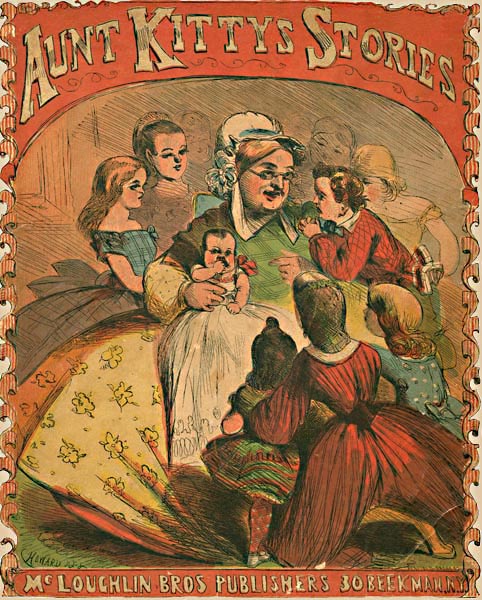
[Pg 2]
AUNT KITTY’S
STORIES.
175 Illustrations.
CONTENTS
Little Bo-peep has lost her sheep
Hickety, pickety, my black hen
Dickery, dickery, dare
Driddlety drum, driddlety drum
A little pig found a fifty dollar note
This is the way the ladies go
THE MARRIAGE OF COCK ROBIN AND JENNY WREN
A carrion crow sat on an oak
What a pretty bunch of flowers
This goose got in the house
THE ROBIN IN WINTER
FOUR LITTLE BOYS
THE LITTLE FISH THAT WOULD NOT DO AS IT WAS BID
THOUGHTLESS JULIA
YOUNG SOLDIERS
LEARNING BY HEART
IMPROVEMENT
THE LITTLE COWARD
IDLE CHILDREN
THE LITTLE GIRL THAT BEAT HER SISTER
A VERY GOOD BOY
THE PLUM CAKE
THE GIDDY GIRL
THE FLOWER AND THE LITTLE MISS
THE KITE
Simple Simon met a pieman
I had a little hobby horse
He that would thrive
Tom, Tom, the piper’s son
A Farmer went trotting upon his grey mare
Old woman, old woman, shall we go a-shearing?
Little Tommy Tittlemouse
Little Miss Muffett
Eggs, butter, cheese, bread
Rain, rain
Tom he was a Pi-per’s son
I had a little dog, they called him Buff
Molly, my sister, and I fell out
Solomon Grundy
Handy Spandy, Jack a-dandy
Go to bed Tom, go to bed Tom
Mary had a pretty bird
Lit-tle boy blue, come blow your horn
I had a lit-tle po-ny
Pe-ter White
See, see. What shall I see?
I had a little hen, the prettiest ever seen
Ride a cock horse
Pus-sy cat ate the dump-lings, the dump-lings
I have a lit-tle sister; they call her Peep, Peep
This lit-tle pig went to mar-ket
One misty, moisty morning
Father Short came down the lane
There was an old woman had three sons
Hink, minx! the old witch winks
CLIMBING ON BACKS OF CHAIRS
THE SQUIRREL
THE SHEEP
A PRESENT FOR ALFRED
THE FAIRING
THE GOOD BOY
MISS SOPHIA
PRETTY PUSS
POLITENESS
MAMA, HOW HAPPY I CAN BE
A FINE THING
SLEEPY TOM
SANDY
THE CARE OF BIRDS
WILLIE WINKIE
COME WHEN YOU ARE CALLED
DOG POMPEY
MISS PEGGY
THE BIRD
THE SETTING SUN
GOOD MAMA
GOOD LITTLE FRED
THE DIZZY GIRL
NEAT LITTLE CLARA
HINTY, MINTY
Come here, my bonnie
CARELESS MARIA
THE PARROT
WHY EMMA IS LOVED
THE GOOD SCHOLAR
NAUGHTY SAM
Two legs sat upon three legs
As I was going up primrose Hill
There was an old man of Tobago
Pease pudding hot
When I was a ba-che-lor, I liv-ed by my-self
To market, to market, to buy a fat pig
Jacky, come give me thy fiddle
Old King Cole
High diddle doubt, my candle’s out
Bat, bat, come under my hat
I’ll tell you story
My little old man and I fell out
Little Tommy Grace
Pus-sy sits be-side the fire. How can she be fair?
Oh, the rus-ty, dus-ty, rus-ty mill-er
There was a crook-ed man, and he went a crook-ed mile
The Li-on and the U-ni-corn were fight-ing for the crown
Thomas a Tat-ta-mus took two T’s
A little boy went into a barn
If all the world were water
Jack be nimble
Cur-ly locks, cur-ly locks, wilt thou be mine?
Mar-ge-ry Mut-ton-pie, and John-ny Bo-peep
Is John Smith with-in?
Old Mother Goose
One, two, buckle my shoe
Jack Sprat could eat no fat
See a pin and pick it up
Leg over leg
There was an old wo-man who liv-ed in a shoe
There was an old woman
We are all in the dumps
Hot cross buns, hot cross buns
See, saw, Mar-ge-ry Daw
Ro-bin and Rich-ard are two pret-ty men
Little Nancy Etticote
See saw, sacradown, sacradown
There was a Piper had a Cow
Sing a song of six-pence, a pock-et full of Rye
A diller, a dollar
Bye, baby bumpkin
As I was going to sell my eggs
Once I saw a little bird come hop, hop, hop
Willy boy, Willy boy, where are you going?
Little Robin Red-breast sat upon a rail
Ding, dong, darrow
Pit, pat, well-a-day
Lit-tle Jack Hor-ner sat in a cor-ner
Lit-tle Tom Tuck-er
Hey diddle diddle, the cat and the fiddle
A dog and a cat went out together
Little Polly Flinders
Four and twen-ty tai-lors went to kill a snail
A little cock-sparrow sat on a tree
Bless you, bless you, bonny bee
One day, an old cat and her kittens
Doctor Foster went to Gloster
John Cook had a little gray mare; he, haw, hum!
Dingty, diddlety, my mammy’s maid
A horse and cart
Who ever saw a rabbit
Boys and girls, come out to play
Jog on, jog on, the footpath way
Hush-a-bye, baby, upon the tree top
DINNER
THE NEW DOLL
GETTING UP
THE LINNET’S NEST
PLAYING WITH FIRE
GRATEFUL LUCY
RUN AND PLAY
THE CUT
SLEEPY HARRY
BREAKFAST AND PUSS
FRIGHTENED BY A COW
THE DUNCE OF A KITTEN
SENSIBLE CHARLES
PUT DOWN THE BABY
DIRTY HANDS
FRANCES AND HENRY
POISONOUS FRUIT
DRESSED OR UNDRESSED
BAPTISM IN CHURCH
THE PET LAMB
Be you to others kind and true
HYMN
TIME TO RISE
FOR NANNIE
THE PUSSY CAT
Give to the Father praise
THE FROLICSOME KITTEN
PENANCE FOR BEATING A BROTHER
THE NEW BOOK
THE DOG
THE COW
THE BUTTERFLY
There was an old wo-man tos-sed up in a bas-ket
To make your candles last for a’
A milking, a milking, my maid
Old father Grey Beard
There was an old woman, as I’ve heard tell
Bye, baby bunting
Away Birds, away!
Ba-a, ba-a, black sheep
One mis-ty morn-ing
Dee-dle, dee-dle, dump-ling, my son John
Swan, swan, over the sea
I had a lit-tle Hus-band, no big-ger than my thumb
Ma-ry, Ma-ry, quite con-tra-ry
Hey, my kit-ten, my kit-ten
Here we go up, up, up
Some lit-tle mice sat in a barn to spin
Ding, dong, bell, Pus-sy’s in the well
As I was going along, long, long
Dance a baby diddit
Hush, baby, my doll, I pray you, don’t cry
Jack Spratt’s pig
The man in the moon
There was an old wo-man, and what do you think?
A Frog he would a-wooing go
Here am I, little jumping Joan
Jack and Gill went up the hill
Pus-sy cat, pus-sy cat, where have you been?
GOOD NIGHT
HOT APPLE PIE
LUCY AND DICKY
THE FAIRY MAN
COME PLAY IN THE GARDEN
THE UMBRELLA
NO BREAKFAST FOR GROWLER
CLEVER LITTLE THOMAS
SULKING
GIVING WITH PRUDENCE
THE FIELD DAISY
THE MOUSE
SHORT ADVICE
LEARNING TO GO ALONE
CHARITY
FOR A LITTLE GIRL THAT DID NOT LIKE TO BE WASHED
THE SNOW BALL
Jenny Wren fell sick upon a merry time
There was a lit-tle man, and he had a lit-tle gun
Daf-fy-down-Dil-ly has come up to town
Mul-ti-pli-ca-tion is a vex-a-tion
Goo-sey, goo-sey, gan-der, whi-ther shall I wan-der?
Peter, Peter, pumpkin eater
When good King Arthur ruled his land
As I went to Bonner
Pitty Patty Polt
Brow, brow, brinkie
Shoe the wild horse, and shoe the grey mare
Lady-bird, Lady-bird
1, 2, 3, 4, 5
Hush-a-bye, baby
Cross patch
Bow-wow-wow
Humpty-Dumpty sat on a wall
The Queen of Hearts
Naughty Willey Bell
The queen of hearts
To market, to market, a gallop, a trot
The North Wind doth blow
When I was a little boy, my mother kept me in
Mary had a pretty bird
Miss Jane had a bag, and a mouse was in it
MAJA’S ALPHABET
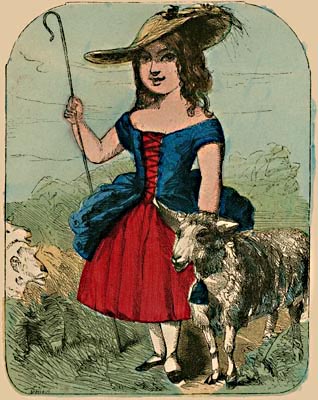 “Little Bo-peep and her sheep,
“Little Bo-peep and her sheep,before she lost them.”
Little Bo-peep has lost her sheep,
And cannot tell where to find ’em;
Leave them alone, and they’ll come home,
And bring their tails behind ’em.
Little Bo-peep fell fast asleep,
And dreamt she heard them bleating;
When she awoke, she found it a joke,
For still they all were fleeting.
Then up she took her little crook,
Determined for to find them;
She found them indeed, but it made her heart bleed,
For they’d left their tails behind them.
It happen’d one day, as Bo-peep did stray
Unto a meadow hard by—
There she espied their tails side by side,
All hung on a tree to dry.
She heaved a sigh, and wiped her eye,
And over the hillocks she raced;
And tried what she could, as a shepherdess should,
That each tail should be properly placed.
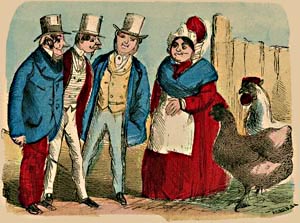
Hickety, pickety, my black hen,
She lays good eggs for gentlemen;
Gentlemen come every day,
To see what my black hen doth lay.
Dickery, dickery, dare,
The pig flew up in the air,
The man in brown soon brought him down.
Dickery, dickery, dare.
Driddlety drum, driddlety drum,
There you see the beggars are come:
Some are here and some are there,
And some are gone to Chidley fair.
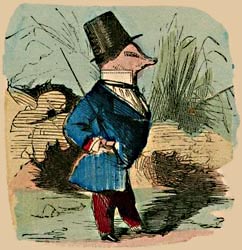
A little pig found a fifty dollar note,
And purchased a hat and a very fine coat,
With trowsers, and stockings, and shoes;
Cravat, and shirt-collar, and gold-headed cane;
Then proud as could be, did he march up the lane,
Says he, I shall hear all the news.
This is the way the ladies go—
Nim, nim, nim.
This is the way the gentlemen go—
Trot, trot, trot.
This is the way the hunters go—
Gallop, gallop, gallop.
THE MARRIAGE OF COCK ROBIN AND JENNY WREN.
It was on a merry time, when Jenny Wren was young,
So neatly as she danced, and so sweetly as she sung,—
Robin Redbreast lost his heart—he was a gallant bird;
He doff’d his hat to Jenny, and thus to her he said:—
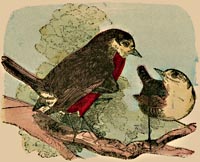
“My dearest Jenny Wren, if you will but be mine,
You shall dine on cherry-pie, and drink nice currant-wine.
“I’ll dress you like a Goldfinch, or like a Peacock gay;
So if you’ll have me, Jenny, let us appoint the day.”
Jenny blushed behind her fan, and thus declared her mind,
“Then let it be to-morrow, Bob; I take your offer kind.
“Cherry pie is very good! so is currant-wine!
But I will wear my brown gown, and never dress too fine.”
Robin rose up early, at the break of day;
He flew to Jenny Wren’s house, to sing a roundelay.
He met Cock and Hen, and bade the Cock declare,
This was his wedding-day with Jenny Wren the fair.
The Cock then blew his horn, to let the neighbors know,
This was Robin’s wedding-day, and they might see the show.
And first came Parson Rook, with his spectacles and band;
And one of Mother Goose’s books, he held within his hand.
Then follow’d him the Lark, for he could sweetly sing,
And he was to be clerk at Cock Robin’s wedding.
He sung of Robin’s love for little Jenny Wren;
And when he came unto the end, then he began again.
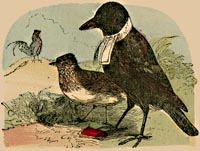
The Bullfinch walk’d by Robin, and thus to him did say,
“Pray, mark, friend Robin Redbreast, that Goldfinch dress’d so gay;—
“What though her gay apparel becomes her very well;
Yet Jenny’s modest dress and look must bear away the bell!”
Then came the Bride and Bridegroom; quite plainly was she dress’d,
And blush’d so much, her cheeks were as red as Robin’s breast.
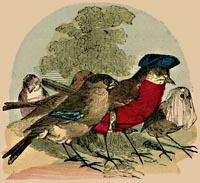
But Robin cheer’d her up; “My pretty Jen,” said he,
“We’re going to be married, and happy we shall be.”
The Goldfinch came on next, to give away the Bride;
The Linnet, being bride’s-maid, walk’d by Jenny’s side.
And as she was a-walking, said, “Upon my word,
I think that your Cock Robin is a very pretty bird!”
“And will you have her, Robin, to be your wedded wife?”
“Yes, I will,” says Robin, “and love her all my life.”
[Pg 6]
“And you will have him, Jenny, your husband now to be?”
“Yes, I will,” says Jenny, “and love him heartily.”
The Blackbird and the Thrush, and charming Nightingale,
Whose sweet jug sweetly echoes through every grove and dale;—
The Sparrow and Tom Tit, and many more, were there:
All came to see the wedding of Jenny Wren the fair.
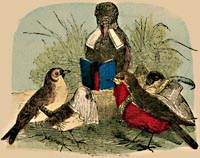
“Oh, then,” says Parson Rook, “who gives this maid away?”
“I do,” says the Goldfinch, “and her fortune I will pay;—
“Here’s a bag of grain of many sorts, and other things beside;
Now happy be the Bridegroom, and happy be the Bride!”
Then on her finger fair, Cock Robin put the ring;
“You’re married now,” says Parson Rook; while the Lark aloud did sing,—
“Happy be the Bridegroom, and happy be the Bride!
And may not man, nor bird, nor beast, this happy pair divide.”
The birds were ask’d to dine; not Jenny’s friends alone,
But every pretty songster that had Cock Robin known.
They had a cherry-pie, besides some currant-wine,
And every guest brought something, that sumptuous they might dine.
Now they all sat or stood, to eat and to drink;
And every one said what he happen’d to think.
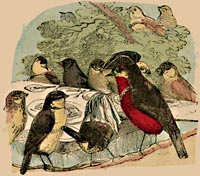
They each took a bumper, and drank to the pair,
Cock Robin the Bridegroom, and Jenny the fair.
The dinner-things removed, they all began to sing;
And soon they made the place near a mile round to ring.
The concert it was fine; and every bird tried
Who best should sing for Robin, and Jenny Wren the Bride.
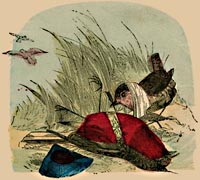
When, in came the Cuckoo, and made a great rout;
He caught hold of Jenny, and pull’d her about.
Cock Robin was angry, and so was the Sparrow,
Who fetch’d in a hurry his bow and his arrow.
His aim then he took, but he took it not right;
His skill was not good, or he shot in a fright;—
For the Cuckoo he miss’d,—but Cock Robin he kill’d!
And all the birds mourn’d that his blood was so spill’d.
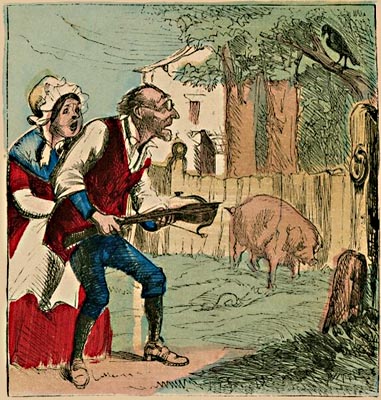
A carrion crow sat on an oak,
Fol de riddle, lol de riddle, he ding do,
Watching a tailor shape his coat!
Sing he, sing ho, the old carrion crow,
Fol de riddle, lol de riddle, he ding do.
Wife, bring me my old beat bow,
Fol de riddle, lol de riddle, he ding do,
That I may shoot yon carrion crow,
Sing he, sing ho, the old carrion crow,
Fol de riddle, lol de riddle, he ding do.
The tailor shot, and he missed his mark,
Fol de riddle, lol de riddle, he ding do,
And shot the miller’s sow right through the heart;
Sing he, sing ho, the old carrion crow,
Fol de riddle, lol de riddle, he ding do.
Wife! oh wife! bring brandy in a spoon;
Fol de riddle, lol de riddle, he ding do,
For the old miller’s sow is in a swoon;
Sing he, sing ho, the old carrion crow,
Fol de riddle, lol de riddle, he ding do.
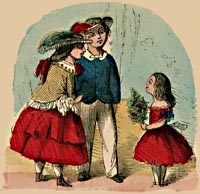
What a pretty bunch of flowers
Little Annie’s got
Did they grow in the meadows,
Or in a flower-pot?
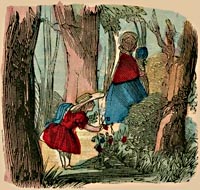
They grew in the wood,
In the deep, deep shade,
Where little Annie plucked them,
And this nose-gay made.
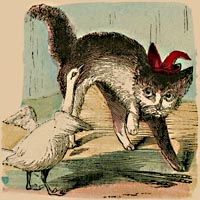
This goose got in the house,
He’d the courage of a mouse,
So he quacked, and he hissed at the kitten;
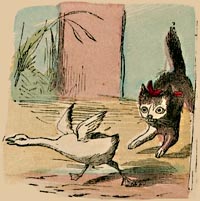
But as she stood at bay,
He quickly ran away;
Afraid of being scratched as well as bitten.
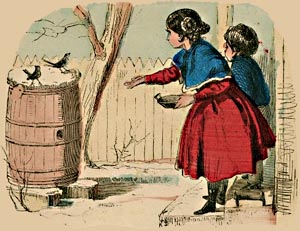
THE ROBIN IN WINTER.
Little Robin, welcome here,
Welcome to my frugal cheer;
Winter chills thy mossy bed,
Come then daily, and be fed.
Little Robin, fear no harm,
Dread not here the least alarm;
All will share with you their bread,
Come then daily, and be fed.
Little Robin, let thy song
Now and then thy stay prolong;
We will give thee food instead,
Come then daily, and be fed.
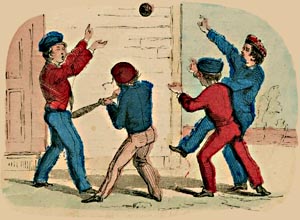
FOUR LITTLE BOYS.
Come, let us play,
Said Tommy Gay;
Well, then, What at
Said Simon Pratt;
At trap and ball,
Said Neddy Hall;
Well, so we will,
Said Billy Gill.
For cakes I’ll play,
Said Tommy Gay;
I’m one for that,
Said Simon Pratt;
I’ll bring them all,
Said Neddy Hall;
And I’ll sit still,
Said Billy Gill.
What a hot day,
Said Tommy Gay;
Then let us chat,
Said Simon Pratt;
On yonder hill,
Said Billy Gill;
Aye, one and all,
Said Neddy Hall.
Come with me, pray,
Said Tommy Gay;
Trust me for that,
Said Simon Pratt;
They eat them all,
Gay, Pratt, and Hall;
And all were ill,
But Billy Gill.
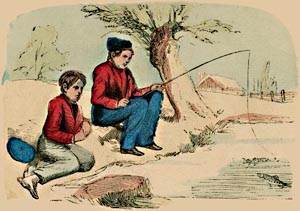
The Little Fish that would not do as it was bid.
Dear mother, said a little Fish,
Pray, is not that a fly?
I’m very hungry, and I wish
You’d let me go and try.
Sweet innocent, the mother cried,
And started from her nook,
That horrid fly is put to hide
The sharpness of the hook!
Now, as I’ve heard, this little Trout
Was young and foolish too,
And so he thought he’d venture out,
To see if it were true.
And round about the hook he played,
With many a longing look,
And, Dear me, to himself he said
I’m sure, that’s not a hook.
I can but give one little pluck:
Let’s see; and so I will.
So on he went, and lo, it stuck
Quite through his little gill.
And as he faint and fainter grew,
With hollow voice he cried,
Dear mother, if I’d minded you,
I need not now have died.
Thoughtless Julia.
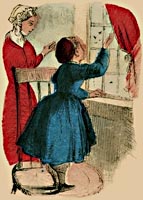
Julia did in the window stand;
Mama then sitting by,
Saw her put out her little hand,
And try to catch a fly.
O do not hurt the pretty thing,
Her prudent mother said;
Crush not its leg or feeble wing,
So beautifully made.
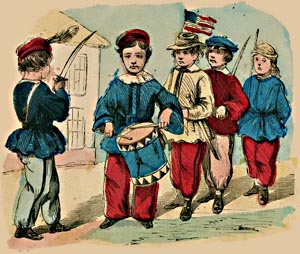
YOUNG SOLDIERS.
Hey, rub-a-dub, dub! here come the boys,
For the Soldiers all make way;
Young Robinet at their head is set
All dressed as warrior gay.
See how he swings his bright tin sword,
To his followers behind;
While from his cap a squirrel’s tail
Flies streaming in the wind.
This is good fun, my merry boys,
To see you I am glad;
But mind you, in reality,
War is a business bad.—
Here’s old Ben Bolt, a soldier brave,
Who lost his legs in war;
With crutch and cane, he hobbles ’round
And shows you many a scar.
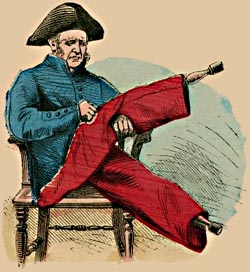
In scenes of fearful blood and strife,
Ah! many low are lain,
And many a young and gallant heart
Is numbered with the slain.
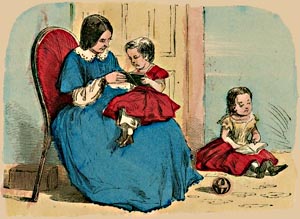
LEARNING BY HEART.
’Tis time that my baby should learn
What so oft he has heard, to repeat,
So shall he some sugar-plums earn;
Then let us begin, my Sweet.
For baby is three years old,
And has senses and memory too,
A great many things he’s been told,
And he can remember a few.
He can tell me, I know, a few things,
Of the garden, the sky, and the weather;
That a bird has two legs and two wings,
But he cannot say ten lines together.
Then let us, my baby, begin,
And try these few lines here to learn,
It will not be a difficult thing,
And then he’ll some sugar-plums earn.
IMPROVEMENT.
Another story, Mother dear,
Did young Maria say;
You read so nice, so loud and clear,—
Another story, pray.
I love that book, I do indeed,
So take it up again;
I think I see the things you read,
You make it all so plain.
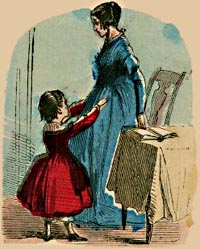
What would I give to read like you,
Why nothing comes amiss!
O, any thing I’ll gladly do,
If you will teach me this.
Maria, then, must learn to spell,
If she would read like me;
She soon may learn to read as well;
O, that I will, said she.
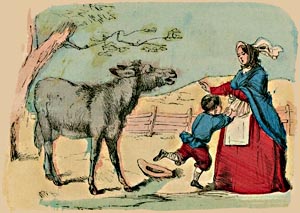
THE LITTLE COWARD.
Why here’s a foolish little man!
Laugh at him, Donkey, if you can:
And Cat and Dog, and Cow and Calf
Come, ev’ry one of you and laugh!
For, only think, he runs away,
If honest Donkey does but bray;
And when the Bull begins to bellow
He’s like a crazy little fellow!
Poor Brindle Cow can hardly pass
Along the hedge to nip the grass,
Or wag her tail to lash the flies,
But off the little booby hies!
And when old Tray comes running too,
With bow, wow, wow, for how d’ye do,
And means it all for civil play,
’Tis sure to make him run away!
But all the while you’re thinking, may be
Ah! well, but this must be a baby.
O, cat and dog, and cow and calf,
I’m not surpris’d to see you laugh,
He’s five years old, and almost half!
Idle Children.
Children who with idle habits
From the school-room haste away,
Wishing out of doors to ramble
Ere they do their lessons say—
They shall have no tasks or reading,
But they must to school be sent,
Because they are a bad life leading,
And this shall be their punishment.
But those who quickly say their lessons,
By mama shall still be taught,
And afterwards, nice stories telling,
Shall hear the books papa has bought.
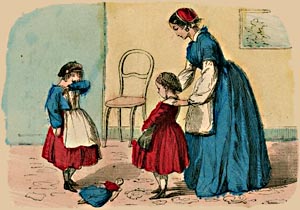
THE LITTLE GIRL THAT BEAT HER SISTER.
Go, go, my naughty girl, and kiss
Your little sister dear;
I must not have such things as this,
Nor noisy quarrels hear.
What! little children scold and fight,
That ought to be so mild;
O Mary, ’tis a shocking sight
To see an angry child.
I can’t imagine, for my part,
The reason of your folly:
As if she did you any hurt,
By playing with your dolly!
See, how the little tears do run
Fast from her watery eye;
Come, my sweet innocent, have done,
’Twill do no good to cry.
Go, Mary, wipe her tears away,
And make it up with kisses;
And never turn a pretty play
To such a pet as this is.
A VERY GOOD BOY.
Mama, my head (poor William said)
So very badly aches,
Tell Brother there, I cannot bear
The tiresome noise he makes.
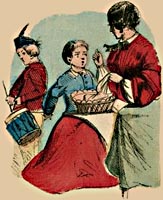
I’m sure, said John, if I had known,
Dear Brother, you were ill,
I would have read, or drawn, instead,
And have remain’d quite still.
Good boys, said she, O ever be
Thus kind to one another;
I am, my dear, much pleased to hear
Your answer to your Brother.
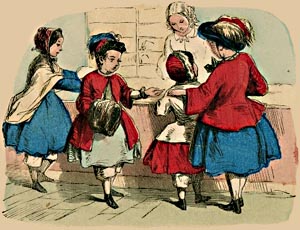
THE PLUM CAKE.
Let us buy,
Said Sally Fry;
Something nice,
Said Betsy Price;
What shall it be?
Said Kitty Lee;
A nice plum cake,
Said Lucy Wake.
A piece for me,
Said Kitty Lee;
A slice I’ll take,
Said Lucy Wake;
Give me a slice,
Said Betsy Price;
All by-and-by,
Said Sally Fry.
I’ll save some cake,
Said Lucy Wake;
And so will I,
Said Sally Fry;
Well, I’ll agree,
Said Kitty Lee;
’Twill do for twice,
Said Betsy Price.
A piece with ice,
Said Betsy Price;
I’ll put some by,
Said Sally Fry;
The third for me,
Said Kitty Lee;
The fourth I’ll take
Said Lucy Wake.
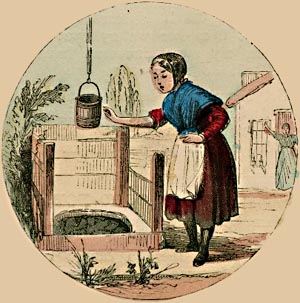
THE GIDDY GIRL.
Miss Helen was always too giddy to heed
What her mother had told her to shun;
For frequently, over the street in full speed,
She would cross where the carriages run.
And out she would go to a very deep well,
To look at the water below;
How naughty! to run to a dangerous well,
Where her mother forbade her to go!
One morning, intending to take but one peep,
Her foot slipt away from the ground;
Unhappy misfortune! the water was deep,
And giddy Miss Helen was drown’d.
THE FLOWER AND THE LITTLE MISS.
About getting up.
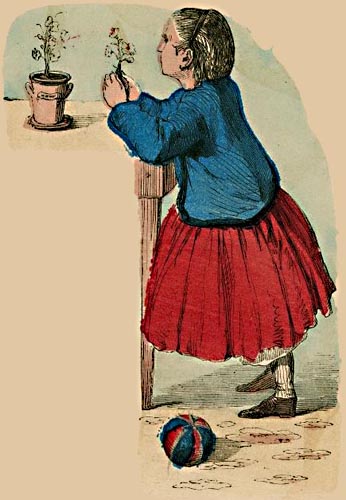
Pretty Flower, tell me why
All your leaves do open wide,
Every morning, when on high
The noble sun begins to ride?
This is why, my lady fair,
If you would the reason know,
For betimes the pleasant air
Very cheerfully doth blow.
And the birds on every tree
Sing a merry, merry tune;
And the busy honey bee
Comes to suck my sugar soon.
This is all the reason why
I my little leaves undo.
Little Miss, come wake and try,
If I have not told you true.
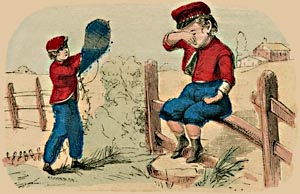
THE KITE.
John White
Flew his kite,
On a boisterous day,
A gale
Broke the tail,
And it soon flew away.
And while
On a stile,
He sat sighing and sad,
Charley Gray
Came that way,
A good natured lad.
“Don’t cry;
Wipe your eye,”
Said he, “little Jack;
Stay here;
Never fear,
And I’ll soon bring it back.”
To the stile,
With a smile,
He presently brought
The kite,
And John White
Thanked him much, as he ought.
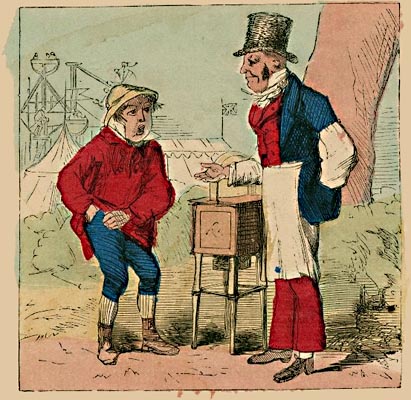
Simple Simon met a pieman,
Going to the fair.
Says Simple Simon to the pieman,
“Let me taste your ware.”
Says the pieman to Simple Simon,
“Show me first your penny.”
Says Simple Simon to the pieman,
“Indeed, I have not any.”
Simple Simon went a-fishing,
For to catch a whale;
All the water he had got,
Was in his mother’s pail.
Simple Simon went to look
If plums grew on a thistle,
He pricked his fingers very much,
Which made poor Simon whistle.
Then Simple Simon went a-hunting,
For to catch a hare;
He rode on a goat about the street,
But could not find one there.
He went for water in a sieve
But soon it all run through;
And now poor Simple Simon
Bids you all adieu!
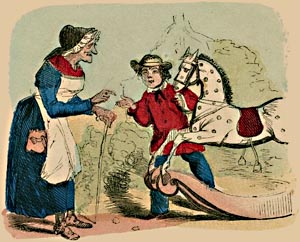
I had a little hobby horse,
And it was dapple grey,
Its head was made of pea-straw,
Its tail was made of hay.
I sold it to an old woman
For a copper groat;
And I’ll not sing my song again
Without a new coat.
He that would thrive,
Must rise at five;
He that hath thriven,
May lie till seven;
And he that by the plough would thrive,
Himself must either hold or drive.
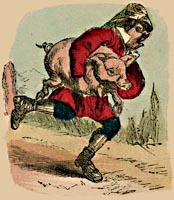
Tom, Tom, the piper’s son,
Stole a pig and away he run;
The pig was eat,
And Tom was beat,
And Tom ran crying down the street.
A Farmer went trotting upon his grey mare,
Bumpety bumpety bump,
With his daughter behind him so rosy and fair,
Lumpety lumpety lump.
A raven cried croak, and they all tumbled down
Bumpety bumpety bump;
The mare broke her knees and the farmer his crown,
Lumpety lumpety lump.
The mischievous raven flew laughing away,
Bumpety bumpety bump,
And vowed he would serve them the same next day,
Lumpety lumpety lump.
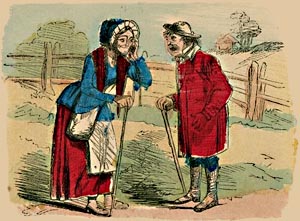
Old woman, old woman, shall we go a-shearing?
Speak a little louder, sir, I am very thick o’ hearing.
Old woman, old woman, shall I kiss you dearly?
Thank you, kind sir, I hear very clearly.
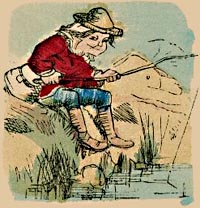
Little Tommy Tittlemouse
Lived in a little house;
He caught fishes
In other men’s ditches.
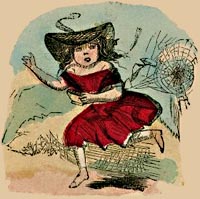
Little Miss Muffett
She sat on a tuffett,
Eating of curds and whey;
There came a little spider
Who sat down beside her,
And frightened Miss Muffett away.
Eggs, butter, cheese, bread,
Stick, stock, stone, dead,
Stick him up, stick him down,
Stick him in the old man’s crown.
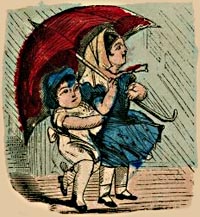
Rain, rain,
Go away,
Come again
April day;
Little Johnny
Wants to play.
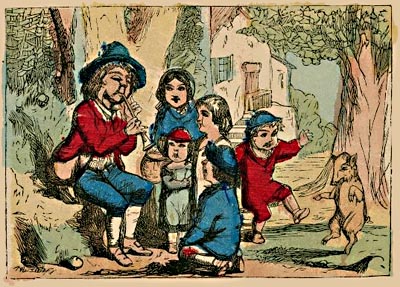
Tom he was a Pi-per’s son,
He learned to play when he was young;
But all the tunes that he could play,
Was “O-ver the hills and far away.”
Now, Tom with his pipe made such a noise,
That he pleas-ed both the girls and boys,
And they all stop-ped to hear him play,
“O-ver the hills and far a-way.”
Tom with his pipe did play with such skill,
That those who heard him could ne-ver stand still;
When-e-ver they heard him they be-gan to dance,
Even pigs on their hind-legs would after him prance.
He met old Dame Trott with a basket of eggs,
He u-sed his pipe and she u-sed her legs;
She danc-ed a-bout till the eggs were all broke,
She be-gan to fret, but he laugh-ed at the joke.
He saw a cross fel-low was beat-ing an ass,
Hea-vy la-den with pots, pans, dish-es, and glass;
He took out his pipe and play-ed them a tune,
And the Jack-ass’s load was light-en-ed full soon.
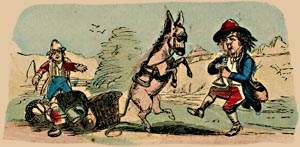
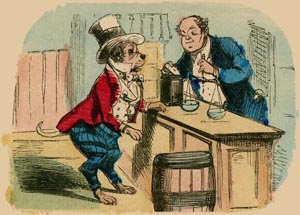
I had a little dog, they called him Buff,
I sent him to the shop for a three cents worth of snuff:
But he lost the bag, and spilt the snuff,
So take that cuff, and that’s enough.
Molly, my sister, and I fell out,
And what do you think it was about?
She loved coffee, and I loved tea,
And that was the reason we couldn’t agree.
Solomon Grundy,
Born on a Monday,
Christened on Tuesday,
Married on Wednesday,
Very ill on Thursday,
Worse on Friday,
Died on Saturday,
Buried on Sunday,
This is the end
Of Solomon Grundy.
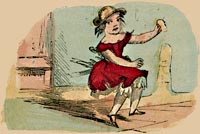
Handy Spandy, Jack a-dandy,
Loves plum-cake and sugar-candy;
He bought some at a grocer’s shop,
And out he came, hop-hop-hop.
Go to bed Tom, go to bed Tom—
Merry or sober, go to bed Tom.
Mary had a pretty bird,
Feathers bright and yellow,
Slender legs, upon my word
He was a pretty fellow.
The sweetest notes he always sung,
Which much delighted Mary,
And often where the cage was hung,
She stood to hear Canary.
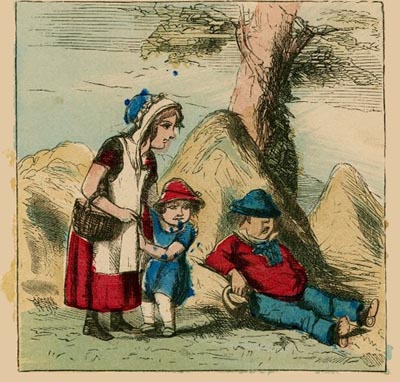
Lit-tle boy blue, come blow your horn;
The sheep’s in the mea-dow, the cow’s in the corn.
Where’s the lit-tle boy that looks af-ter the sheep?
He’s un-der the hay-cock fast a-sleep.
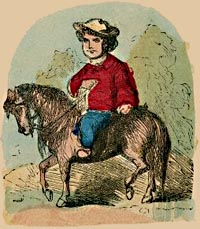
I had a lit-tle po-ny;
They call-ed him dap-ple grey.
I lent him to a lady,
To ride a mile a-way.
She whip-ped him, she slash-ed him,
She rode him through the mire;
I would not lend my po-ny now,
For all the lady’s hire.
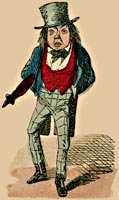
Pe-ter White
Will ne’er go right,
Would you know the rea-son why?
He fol-lows his nose,
Wher-ever he goes,
And that stands all aw-ry.
See, see. What shall I see?
A horse’s head where his tail should be.
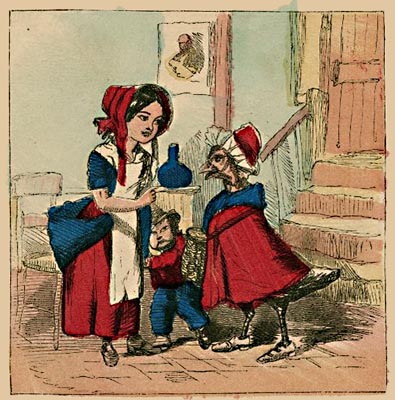
I had a little hen, the prettiest ever seen,
She washed me the dishes, and kept the house clean:
She went to the mill to fetch me some flour,
She brought it home in less than an hour,
She baked me my bread, she brewed me my ale,
She sat by the fire, and told many a fine tale.
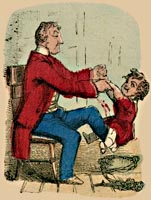
Ride a cock horse
To Ban-bu-ry Cross,
To see lit-tle Jen-ny
Up-on a white horse.
Rings on her fin-gers,
Bells on her toes,
She shall have mu-sic
Wher-ever she goes.
Pus-sy cat ate the dump-lings, the dump-lings;
Pus-sy cat ate the dump-lings.
Mam-ma stood by, and cried, “Oh, fie!
Why did you eat the dump-lings?”
I have a lit-tle sister; they call her Peep, Peep.
She wades the wa-ter, deep, deep, deep;
She climbs the moun-tains, high, high, high.
Poor lit-tle thing! she has but one eye.
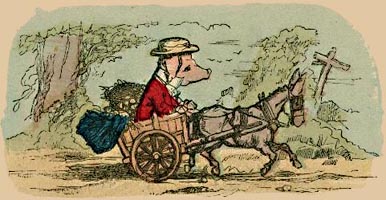
1. This lit-tle pig went to mar-ket.
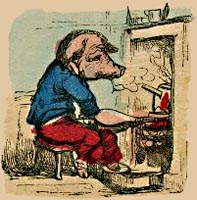
2. This lit-tle pig stay-ed at home.
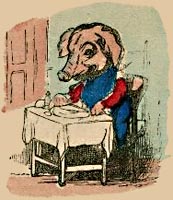
3. This lit-tle pig got roast beef.
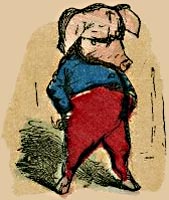
4. This lit-tle pig got none.
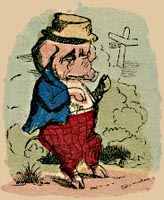
5. This lit-tle pig cried wee, wee,
all the way home.
One misty, moisty morning,
When cloudy was the weather,
I chanced to meet an old man clothed all in leather.
He began to compliment, and I began to grin,
How do you do, and how do you do?
And how do you do again?
Father Short came down the lane,
Oh! I’m obliged to hammer and smite
From four in the morning till eight at night,
For a bad master and a worse dame.
There was an old woman had three sons,
Jeffery, Jemmy and John;
Jeffery was hung, and Jemmy was drowned,
And Johnny was never more found:
So there was an end to these three sons,
Jeffery, Jemmy and John.
Hink, minx! the old witch winks,
The fat begins to fry:
There’s nobody at home but jumping Joan,
Father, mother, and I.
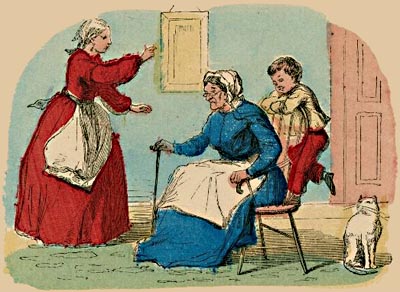
CLIMBING ON BACKS OF CHAIRS.
What, climb on the back of a chair!
O Henry, how can you do so?
Sometime, if you do not take care,
You will get a most terrible throw.
Suppose grand-mama had got up,
Pray what had become of you then?
Indeed, my dear Henry, I hope
You never will do so again.
Your poor little teeth may be broke,
Or your face get some terrible bruise,
Indeed, and indeed, ’tis no joke,
And you must not do just as you choose.
For suppose there’s no danger at all,
’Tis your duty to mind what I say;
So I’ll punish you, Henry, next time,
You dare my commands disobey.
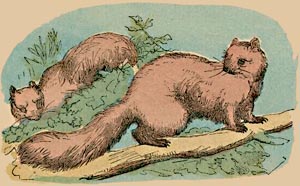
THE SQUIRREL.
“The Squirrel is happy, the Squirrel is gay,”
Little Mary once said to her brother;
“He has nothing to do, or think of but play,
And to jump from one bough to another.”
The Squirrel, dear Mary, is merry and wise,
For true wisdom and joy go together;
He lays up in Summer his Winter supplies,
And then he don’t mind the cold weather.
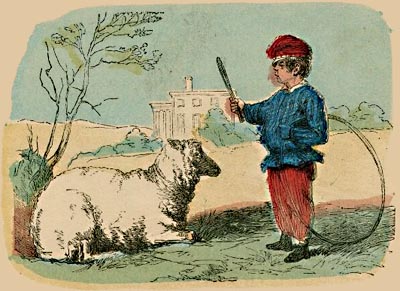
THE SHEEP.
Lazy Sheep, pray tell me why
In the pleasant fields you lie,
Eating grass and daisies white,
From the morning till the night?
Every thing can something do,
But what kind of use are you?
Nay, my little master, nay,
Do not serve me so, I pray;
Don’t you see the wool that grows
On my back, to make your clothes?
Cold, and very cold you’d get,
If I did not give you it.
True, it seems a pleasant thing
To nip the daisies in the spring,
But many chilly nights I pass
On the cold and dewy grass,
Or pick a scanty dinner where
All the common’s brown and bare.
Then the farmer comes at last,
When the merry spring is past,
And cuts my woolly coat away,
To warm you in the winter’s day;
Little master, this is why
In the pleasant fields I lie.
A PRESENT FOR ALFRED.
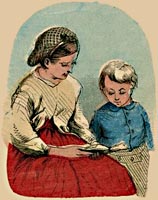
Dear Alfred, I’ve a gift for you,
A present from your Aunt;
A prayer-book. Can you read it through?
Said Alfred—No, I can’t.
But if I teach you, will you try
To learn, and sit quite still?
And with your utmost power apply?
Said Alfred—Yes, I will.
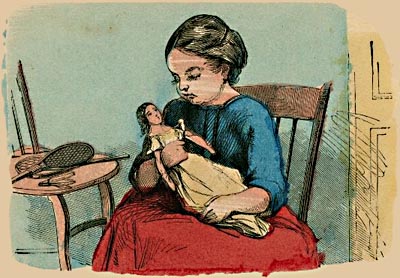
THE FAIRING.
Oh dear! what a beautiful Doll
My sister has bought at the fair!
She says I must call it “Miss Poll,”
And make it a bonnet to wear.
O pretty new Doll! it looks fine;
Its cheeks are all cover’d with red;
But, pray, will it always be mine?
And, pray, may I take it to bed?
How kind was my sister to buy
This Dolly, with hair that will curl!
Perhaps, if you want to know why,
She’ll tell you I’ve been a good girl.
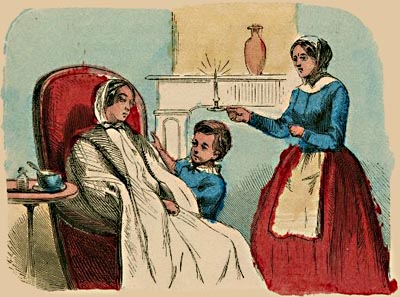
THE GOOD BOY.
When Philip’s good mama was ill,
The servant begg’d he would be still.
Because the doctor and the nurse
Had said that noise would make her worse.
At night, when Philip went to bed,
He kiss’d mama, and whisp’ring said,
“My dear mama, I never will
Make any noise when you are ill.”
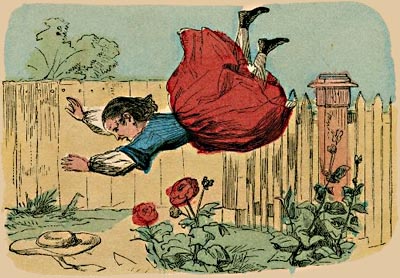
MISS SOPHIA.
Miss Sophy, one fine sunny day,
Left her work and ran away:
When soon she reach’d the garden gate,
Which finding lock’d, she would not wait,
But tried to climb and scramble o’er
A gate as high as any door.
Now little girls should never climb,
And Sophy won’t another time,
For when upon the highest rail
Her frock was caught upon a nail,
She lost her hold, and, sad to tell,
Was hurt and bruis’d—for down she fell.
PRETTY PUSS.
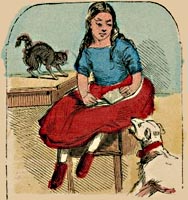
Come, pretty Cat!
Come here to me!
I want to pat
You on my knee.
Go, naughty Tray!
By barking thus,
You’ll drive away,
My pretty Puss.
POLITENESS.
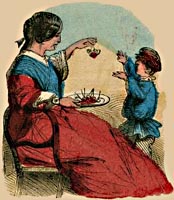
Good little boys should never say,
I will, and, Give me these;
O no! that never is the way,
But, Mother, if you please.
And, if you please, to sister Ann,
Good boys to say are ready;
And, Yes, Sir, to a gentleman,
And, Yes, Ma’am, to a lady.
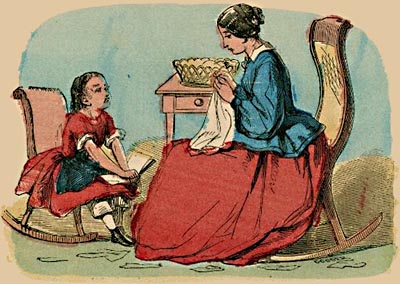
MAMA, HOW HAPPY I CAN BE.
Mama, how happy I can be,
Whilst sitting face to face with thee,
I hear you gently speak, and see
Your needle quickly fly!
’Tis then you teach my little heart
That virtue is the fairest part,
And thinking on how good thou art,
To be as good I try.
Then speaking of God’s awful power,
His care and kindness every hour,
I learn to love and to adore
This Father in the sky.
And, taught no bad or idle ways,
I try to gain your love and praise,
And wonder whilst on you I gaze,
Why any fear to die.
Since God’s indulgent care is shown,
In calling each good child his own,
We’ll happy be before his throne,
When called up on high.
And there, mama, may I and you
Love God’s commands as here we do,
And love each other ever too,
Together in the sky.
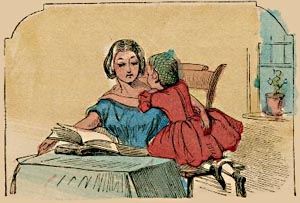
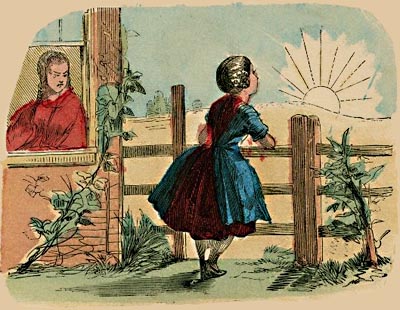
A FINE THING.
Who am I, with noble face,
Shining in a clear blue place?
If to look at me you try,
I shall blind your little eye.
When my noble face I show
Over yonder mountain blue,
All the clouds away do ride,
And the dusky night beside.
Then the clear wet dews I dry,
With the look of my bright eye;
And the little birds awake,
Many a merry tune to make.
Cowslips then, and harebells blue,
And lily-cups their lips undo,
For they shut themselves up tight,
All the dark and foggy night.
Then the busy people go,
Every one his work unto;
Little girl, when your’s is done,
Guess if I am not the Sun.
SLEEPY TOM.
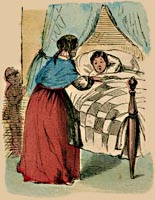
Get up, little boy,
You are sleeping too long;
Your brother is dressed,
He is singing a song,
And Tom must be wakened,
O, fie!
Come, open the curtains,
And let in the light;
For children should only
Be sleepy at night,
When stars may be seen
In the sky.
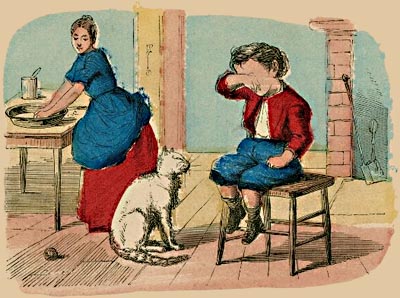
SANDY.
Wee Sandy in the corner,
Sits crying on a stool;
And deep the laddie rues
Playing truant from the school.
So you’ll learn from silly Sandy,
He’s gotten such a fright;
To do nothing through the day,
That may cause you tears at night.
Those who will not be advised,
Are sure to rue ere long;
And many pains it costs them
To do the thing that’s wrong.
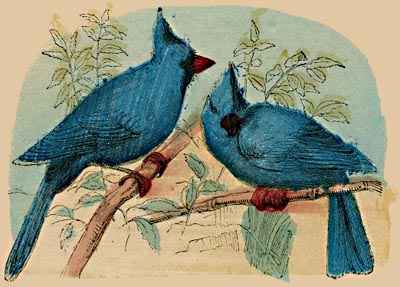
THE CARE OF BIRDS.
Who gave the bird its feathers bright,
Its pretty breast to warm;
In winter’s cold to keep it quite
Preserved from every harm?
Who taught the bird to build its nest
Of wool, and hay, and moss;
Who taught it how to weave it best,
And lay the twigs across?
’Twas God who taught it all the way,
And gave it power and skill;
And teaches children when they pray,
To do His holy will.
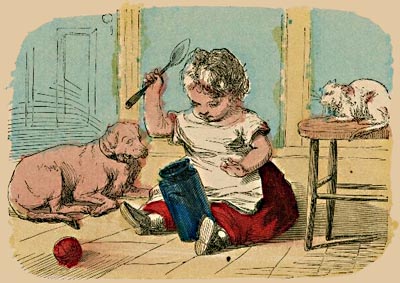
WILLIE WINKIE.
Hey! Willie Winkie,
Are you coming then?
The cat’s singing gay tunes
To the sleeping hen.
The dog is lying on the floor,
And does not even peep;
But here’s a wakeful laddie,
That will not fall asleep.
Anything but sleep, you rogue,
Glowing like the moon;
Rattling in a stone jug,
With an iron spoon.
Rumbling, tumbling all about
Crowing like a cock;
Screaming like I don’t know what
Waking sleeping folks.
Hey! Willie Winkie!
Can’t you keep him still,
Wriggling off a body’s knee
Like a very eel.
That has with sleep a battle,
Before he’s done with play,
A wee, wee, dumpy, toddling lad
That runs the livelong day.
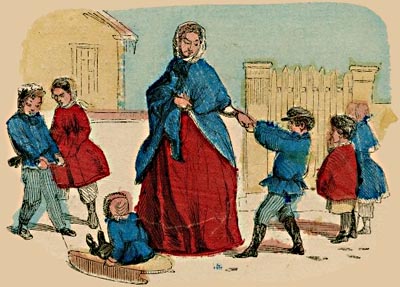
COME WHEN YOU ARE CALLED.
Where’s Susan, and Kitty, and Jane?
Where’s Billy, and Sammy, and Jack?
O, there they are down in the lane;
Go, Betty, and bring them all back.
But Billy is rude and won’t come,
And Sammy is running too fast;
Come, dear little children come home,
And Billy is coming at last.
I’m glad he remembers what’s right,
For though he likes sliding on ice,
He should not be long out of sight,
And never want sending for twice.
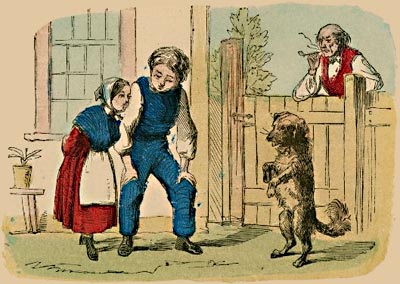
DOG POMPEY.
Come hither little Dog to play,
And do not go so far away,
But stand and beg for food;
And if your tail I chance to touch,
You must not snarl so very much,
Pray Pompey don’t be rude.
The Dog can eat and drink and sleep,
And help to bring the Cows and Sheep,
O, hear how Pompey barks:
Hark! hark! he says, “Bow Wow! bow wow!”
Then run away good Pompey now,
You’ll tire us with your noise.
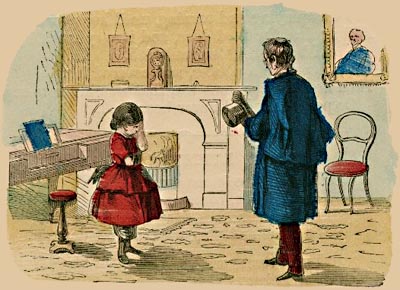
MISS PEGGY.
As Peggy was crying aloud for a cake,
Which her mother had said she was going to make,
A gentleman knock’d at the door!
He enter’d the parlor and show’d much surprise,
That it really was Peggy who made all the noise,
For he never had heard her before.
Miss Peggy asham’d, and to hide her disgrace,
Took hold of her frock, and quite cover’d her face,
For she knew she was naughty just then
And, instantly wiping the tears from her eyes,
She promis’d her mother to make no more noise,
And kiss’d her again and again.
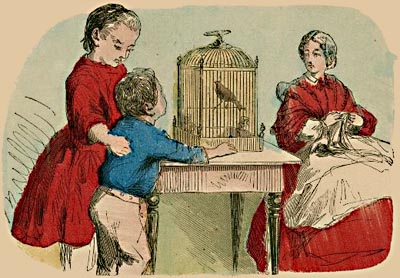
THE BIRD.
Look, what a pretty Bird I’ve got!
In yonder island field ’twas caught;
Just see its breast and painted wings,
And listen, John, how sweet it sings.
Do let me keep it, I’ll engage
To mind it safely in this cage;
And not a moment will I ask
To idle from my school or task.
I’ll feed you well, my pretty Bird,
With worms and crumbs of bread and seed,
And no ill-natured cat is here
To fill your little breast with fear.
Said kind Mama, O do not so,
But haste, Maria, let it go
And then among the feathered throng,
’Twill treat you with its pretty song.
THE SETTING SUN.
Papa, the Sun is setting now
I see him in the west,
And all this weary world below
May now retire to rest:
Whilst in those countries far beyond,
The day begins to break,
A many a child, and many a bird,
Doth now begin to wake.
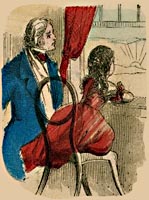
And when the morning dawns again,
The Sun comes to our east,
Then evening will begin with them,
And they to bed will haste.
How very good of God it is,
To make the Sun to go
About this great round world of ours,
To light each country so.
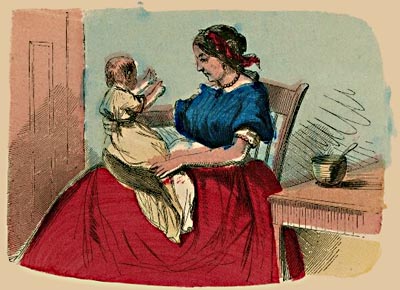
GOOD MAMA.
Love, come and sit upon my knee,
And give me kisses, one, two, three,
And tell me whether you love me,
My baby.
For this I’m sure, that I love you,
And many, many things I do,
And all day long I sit and sew
For baby.
And then at night I lay awake,
Thinking of things that I can make,
And trouble that I mean to take
For baby.
And when you’re good and do not cry
Nor into wicked passion fly,
You can’t think how papa and I
Love baby.
But, if my little girl should grow
To be a naughty child, I know
’Twould grieve mama to serve her so,
My baby.
And when you saw me pale and thin,
By grieving for my baby’s sin,
I think, you’d wish that you had been
A better baby.
Good Little Fred.
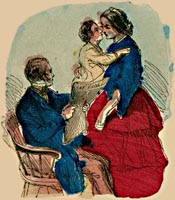
When little Fred was call’d to bed
He always acted right;
He kiss’d Mama, and then Papa,
And wish’d them both good night.
He made no noise, like naughty boys
But quietly up stairs
Directly went, when he was sent,
And always said his prayers.
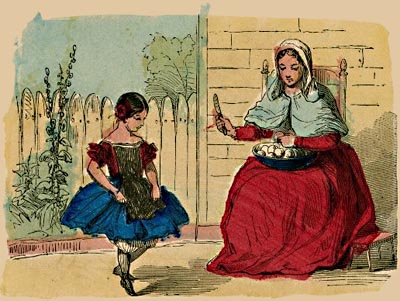
THE DIZZY GIRL.
As Frances was playing, and turning around,
Her head grew so giddy, she fell to the ground;
’Twas well that she was not much hurt:
But, O what a pity! her frock was so soiled,
That had you beheld the unfortunate child,
You had seen her all covered with dirt.
Her mother was sorry, and said, Do not cry,
And Mary shall wash you, and make you quite dry,
If you’ll promise to turn round no more.
What, not in the parlor? the little girl said:
No, not in the parlor; for lately I read,
Of a girl who was hurt with the door.
She was playing and turning, until her poor head
Fell against the hard door, and it very much bled,
And I heard Dr. Camomile tell,
That he put on a plaster, and covered it up,
Then he gave her some tea, that was bitter to sup,
Or perhaps it had never been well.
NEAT LITTLE CLARA.
Little Clara, come away,
Little Clara, come and play;
Leave your work, Maria’s here,
So come and play with me, my dear.
I will come, and very soon,
For I always play at noon,
But must put my work away,
Ere with you I come and play.
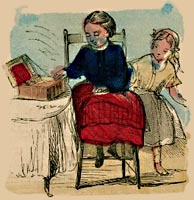
First my bodkin I must place
With my needle in their case;
I like to put them by with care
And then I always find them there.
There’s my cotton, there’s my thread,
Thimble in its little bed;
All is safe—my box I lock,
Now I come—’tis twelve o’clock.
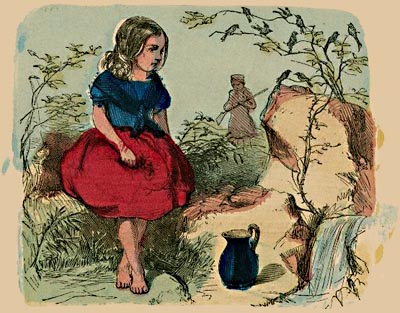
HINTY, MINTY.
Hinty, Minty, Irish maid,
Picks roses sweet in briar’s shade;
On higher briar, by the rock,
Are ten Sparrows in a flock,
That sit and sing
By cooling spring,
When shoot one! shoot two!
Comes sportsman Tom in jacket blue.
O, U, T—out!—away they go on nimble wings,
Over the hills,
And through the dells,
Where Minty dwells,
With many pretty things.
Yet strike one! strike two!
From out the flock, eight only flew,
And two are now but game.
O, cruel Tom, let birdies be,
And blithely sing from bush and tree.
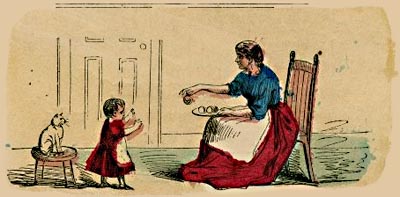
Come here, my bonnie,
Come here to me;
Rosy cheeked apples
You shall have three—
All full of honey,
They dropped from the tree,
Like your bonny self—
All the sweeter that they’re wee.
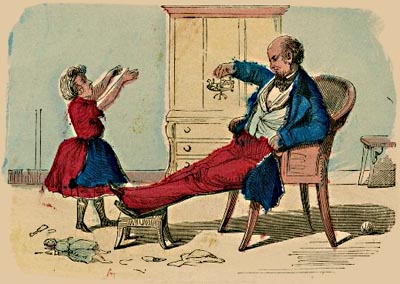
CARELESS MARIA.
Maria was a careless child,
And grieved her friends by this:
Where’er she went,
Her clothes were rent,
Her hat and bonnet spoiled,
A careless little miss.
Her gloves and mits were often lost,
Her tippet sadly soiled;
You might have seen
Where she had been,
For toys all round were tossed,
O what a careless child.
One day her uncle bought a toy,
That round and round would twirl,
But when he found
The littered ground,
He said, I don’t tee-totums buy
For such a careless girl.
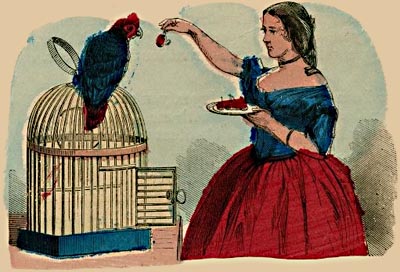
THE PARROT.
Sweet Poll! his doting mistress cries,
Sweet Poll! the mimic bird replies
And calls aloud for sack.
She next instructs him in the kiss,
’Tis now a little one, like Miss,—
And now a hearty smack!
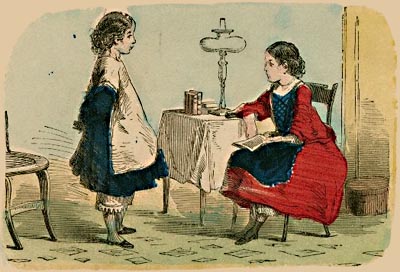
WHY EMMA IS LOVED.
Little Mary call’d Emma, who was just skipping by,
And she said, little cousin, can you tell me why
You are loved so much better by people than I?
My face is as clean, and my hair shines like gold,
And my walk and my dress are as nice to behold,
Yet nobody likes me for that, I am told.
Ah, Mary, she said, this is all very true,
But if half as much mischief were I to do,
Indeed people would love me no better than you.
Your face is as clean, and your hair is as bright,
Your frock is as tidy, your hands are as white,
But there’s one thing, dear Mary—you seldom do right.
If Mama bids less noise to be made when we play,
Or desires you be still whilst your lessons you say,
You never do try these commands to obey.
And when people are talking, you never care how
You interrupt what they’re saying, which is ill-bred, you know,
And papa has so oft bid us not to do so.
You take grand-mama’s pies, you climb on her chair,
You lay hold of the gowns as you go up the stair,
And you gather the flowers that on the beds are.
Now I am no taller, nor bigger, you see,
Yet nobody here is angry with me,
Because I have learnt so obedient to be.
I mind what mama says, whatever it is,
And when people are busy take care not to tease,
But endeavor, as much as I’m able, to please.
Then said Mary to Emma, O now do I see
Why you are more loved, and more happy than me;
And we’re like mama’s tale of the Wasp and the Bee.
I remember it said, little children beware,
Because like the Wasp if you ill behaved are,
You will never be loved, if you’re ever so fair.
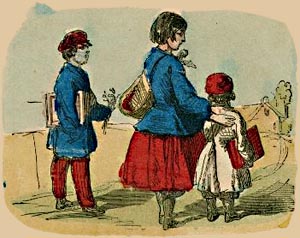
THE GOOD SCHOLAR.
Joseph West had been told,
That if, when he grew old,
He had not learnt rightly to spell,
Though his writings were good,
’Twould be not understood:
And Joe said, I will learn my task well.
And he made it a rule
To be silent at school,
And what do you think came to pass?
Why he learnt it so fast,
That from being the last,
He soon was the first in the class.
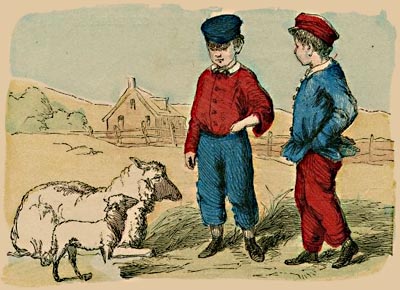
NAUGHTY SAM.
Tom and Charles once took a walk,
To see a pretty lamb;
And, as they went, began to talk
Of little naughty Sam.
Who beat his youngest brother, Bill,
And threw him in the dirt;
And when his poor mama was ill,
He teas’d her for a squirt.
And I, said Tom, won’t play with Sam
Although he has a top:
But here the pretty little lamb
To talking put a stop.
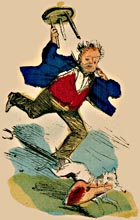
Two legs sat upon three legs,
With one leg in his lap;
In comes four legs,
And runs away with one leg;
Up jumps two legs,
Catches up three legs,
Throws it after four legs,
And makes him bring one leg back.
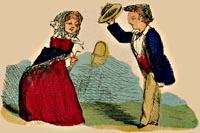
As I was going up primrose Hill
Primrose Hill was dirty;
There I met a pretty Miss,
And she dropped me a curtsy.
Little Miss, pretty Miss,
Blessings light upon you,
If I had half a crown a day,
I’d spend it all upon you.
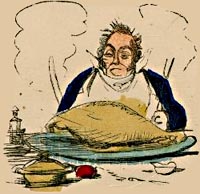
There was an old man of Tobago,
Who lived on rice, gruel, and sago,
Till, much to his bliss,
His physician said this,
To a leg, sir, of mutton you may go.
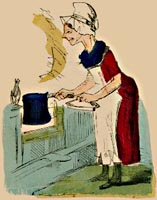
Pease pudding hot,
Pease pudding cold,
Pease pudding in the pot,
Nine days old.
Some like it hot,
Some like it cold,
Some like it in the pot,
Nine days old.
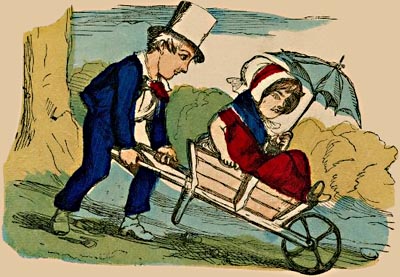
When I was a ba-che-lor, I liv-ed by my-self.
And all the meat I got I put upon a shelf;
The rats and the mice did lead me such a life,
That I went to Lon-don, to get my-self a wife.
The streets were so broad, and the lanes were so nar-row,
I could not get my wife home with-out a wheel-bar-row.
The wheel-bar-row broke, my wife got a fall,
Down tum-bled wheel-bar-row, lit-tle wife, and all.
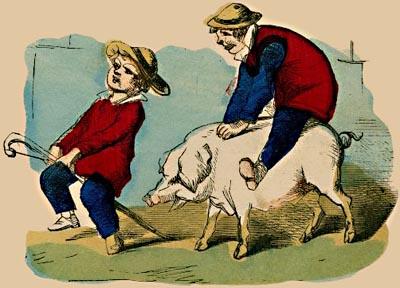
To market, to market, to buy a fat pig,
Home again, home again, jiggety jig.
To market, to market, to buy a fat hog,
Home again, home again, jiggety jog.
Jacky, come give me thy fiddle,
If ever thou mean to thrive.
Nay, I’ll not give my fiddle
To any man alive.
If I should give my fiddle,
They’ll think that I’m gone mad;
For many a joyful day
My fiddle and I have had.
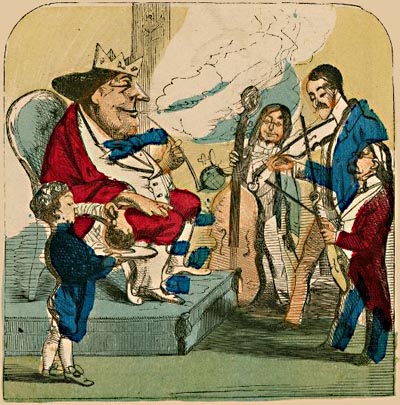
Old King Cole,
Was a merry old soul,
And a merry old soul was he,
And he called for his pipe,
And he called for his glass,
And he called for his fiddlers three.
And every fiddler, he had a fine fiddle,
And a very fine fiddle had he;
“Tweedle dee, tweedle dee,” said the fiddlers,
“Oh there’s none so rare
“As can compare
“With King Cole and his fiddlers three.”
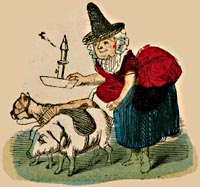
High diddle doubt, my candle’s out,
My little maid is not at home;
Saddle my hog, and bridle my dog,
And fetch my little maid home.
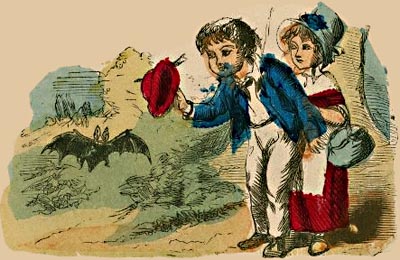
Bat, bat, come under my hat,
And I’ll give you a slice of bacon,
And when I bake I’ll give you a cake,
If I am not mistaken.
I’ll tell you story,
About John-a-Nory:
And now my story’s begun.
I’ll tell you another,
About Jack and his brother,
And now my story’s done.
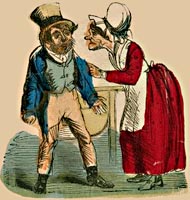
My little old man and I fell out,
I’ll tell you what ’twas all about,
I had money and he had none,
And that’s the way the noise begun.
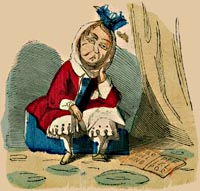
Little Tommy Grace
Had a pain in his face,
So bad that he could not learn a letter;
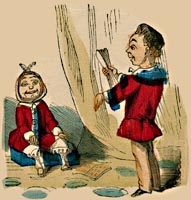
When in came Dicky Long,
Singing such a funny song,
That Tommy laughed, and found his face much better.
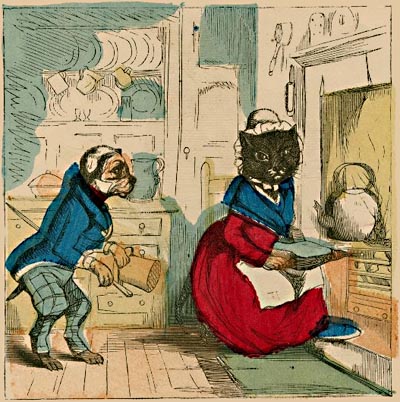
Pus-sy sits be-side the fire. How can she be fair?
In walks a lit-tle dog-gy, Pus-sy, are you there?
Oh, the rus-ty, dus-ty, rus-ty mill-er.
I’ll not change my wife for gold or sill-er.
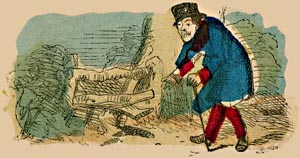
There was a crook-ed man, and he went a crook-ed mile,
And he found a crook-ed six-pence a-gainst a crook-ed stile;
He bought a crook-ed cat, which caught a crook-ed mouse,
And they all liv-ed to-ge-ther in a lit-tle crook-ed house.
The Li-on and the U-ni-corn were fight-ing for the crown,
The Li-on beat the U-ni-corn all round a-bout the town.
Some gave them white bread, some gave them brown,
Some gave them plum-cake, and sent them out of town.
Thomas a Tat-ta-mus took two T’s
To tie two Tups to two tall trees,
To fright-en the ter-ri-ble Thomas a Tat-ta-mus.
Tell me how many T’s there are in all THAT.
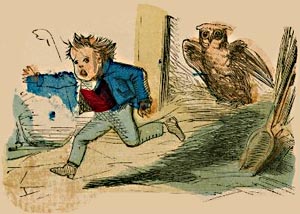
A little boy went into a barn,
And lay down on some hay;
An owl came out and flew about,
And the little boy ran away.
If all the world were water,
And all the water were ink,
What should we do for bread and cheese?
What should we do for drink?
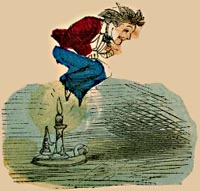
Jack be nimble,
Jack be quick,
And Jack jump over the candlestick.
Cur-ly locks, cur-ly locks, wilt thou be mine?
Thou shalt not wash the dish-es, nor yet feed the swine;
But sit on a cush-ion, and sew a fine seam,
And feed up-on straw-ber-ries, su-gar, and cream.
Mar-ge-ry Mut-ton-pie, and John-ny Bo-peep,
They met to-ge-ther in Grace-church Street;
In and out, in and out, o-ver the way,
Oh! says John-ny, ’tis Chop-nose Day.
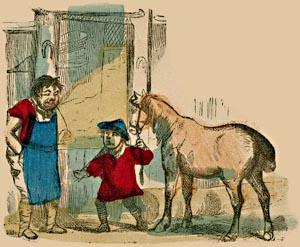
Is John Smith with-in?
Yes, that he is.
Can he set a shoe?
Aye, mar-ry, two.
Here a nail, there a nail,
Tick, tack, too.
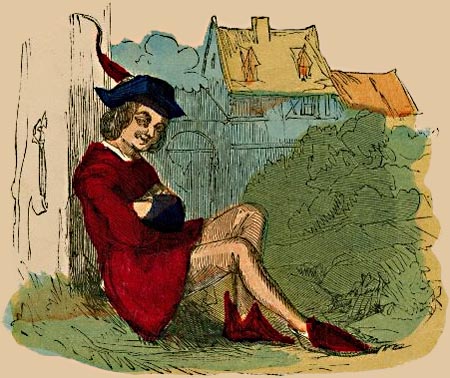
Old Mother Goose,
When she wanted to wander,
Would ride through the air
On a very fine gander.
Mother Goose had a house,
’Twas built in a wood,
Where an owl at the door
For sentinel stood.
This is her son Jack,
A smart-looking lad;
He is not very good,
Nor yet very bad.
She sent him to market,
A live goose he bought.
“Here, mother,” says he,
“It will not go for nought.”
Jack’s goose and her gander
Grew very fond,
They’d both eat together,
Or swim in one pond.
Jack found one morning,
As I have been told,
His goose had laid him
An egg of pure gold.
Jack rode to his mother,
The news for to tell;
She call’d him a good boy,
And said it was well.
Jack sold his gold egg
To a rogue of a Jew,
Who cheated him out of
The half of his due.
Then Jack went a-courting
A lady so gay,
As fair as the Lily,
And sweet as the May.
The Jew and the Squire
Came close at his back,
And began to belabor
The sides of poor Jack.
And then the gold egg
Was thrown into the sea,
But Jack he jump’d in,
And got it back presently.
The Jew got the goose,
Which he vow’d he’d kill,
Resolving at once
His pockets to fill.
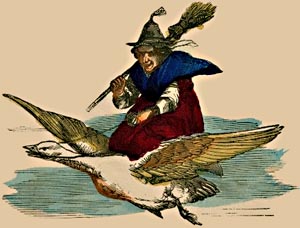
Jack’s mother came in,
And caught the goose soon,
And, mounting its back,
Flew up to the moon.
One, two, buckle my shoe;
Three, four, open the door;
Five, six, pick up sticks;
Seven, eight, lay them straight;
Nine, ten, a good fat hen.
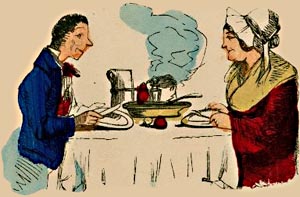
Jack Sprat could eat no fat,
His wife could eat no lean;
And so betwixt them both, you see,
They licked the platter clean.
See a pin and pick it up,
All the day you’ll have good luck.
See a pin and let it lay,
Bad luck you’ll have all the day.
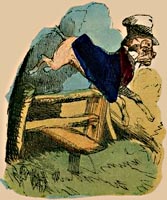
Leg over leg,
As the dog went to Dover,
When he came to a stile
Jump he went over.
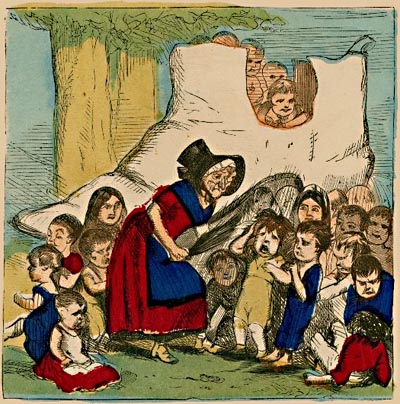
There was an old wo-man who liv-ed in a shoe,
She had so ma-ny chil-dren, she didn’t know what to do;
She gave them some broth, with-out any bread,
She whip-ped them all round, and sent them to bed.
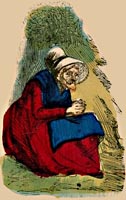
There was an old woman
Lived under a hill,
And if she’s not gone
She lives there still.
We are all in the dumps,
For diamonds are trumps,
The kittens are gone to St. Paul’s;
The babies are bit,
The moon’s in a fit,
And the houses are built without walls.
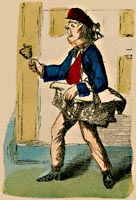
Hot cross buns, hot cross buns,
One a penny, two a penny,
Hot cross buns.
If your daughters don’t like them,
Give them to your sons,
One a penny, two a penny,
Hot cross buns.
See, saw, Mar-ge-ry Daw,
Jen-ny shall have a new mas-ter;
She shall have but a pen-ny a day,
Be-cause she can’t work any fast-er.
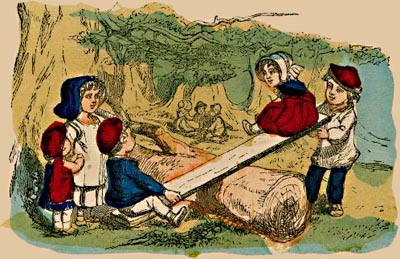
Ro-bin and Rich-ard are two pret-ty men,
They laid in bed till the clock struck ten;
Then up starts Ro-bin and looks in the sky,
“Oh; bro-ther Rich-ard, the sun’s very high!
You go on with the bot-tle and bag,
And I’ll come af-ter with jol-ly Jack Nag.”
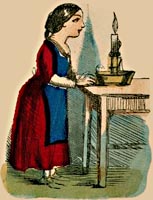
Little Nancy Etticote,
In a white petticoat,
With a red nose;
The longer she stands,
The shorter she grows.
[a candle.]
See saw, sacradown, sacradown,
Which is the way to Boston town?
One foot up, the other foot down,
That is the way to Boston town.
Boston town’s changed into a city,
But I’ve no room to change my ditty.
There was a Piper had a Cow,
And he had naught to give her,
He pull’d out his pipes and play’d her a tune,
And bade the cow consider.
The cow considered very well,
And gave the piper a penny,
And bade him play the other tune,
“Corn rigs are bonny.”
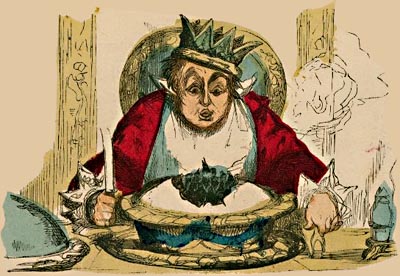
Sing a song of six-pence, a pock-et full of Rye,
Four and twen-ty Black-birds baked in a Pie;
When the Pie was o-pen-ed, the Birds be-gan to sing;
Was not that a dain-ty dish to set before a King?
The King was in the Count-ing-house, count-ing out his mo-ney;
The Queen was in the Par-lour, eat-ing bread and ho-ney;
The Maid was in the Gar-den, hang-ing out the clothes.
By came a Black-bird, and snap-ped off her nose.
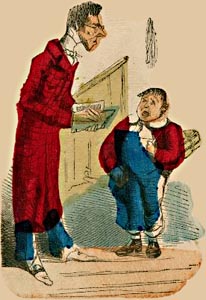
A diller, a dollar,
A ten o’clock scholar,
What makes you come so soon?
You used to come at ten o’clock,
But now you come at noon.
Bye, baby bumpkin,
Where’s Tony Lumpkin?
My lady’s on her death-bed,
With eating half a pumpkin.
As I was going to sell my eggs,
I met a man with bandy legs,
Bandy legs and crooked toes,
I tripp’d up his heels and he fell on his nose.
Once I saw a little bird come hop, hop, hop;
So I cried, little bird, will you stop, stop, stop?
And was going to the window to say how do you do?
But he shook his little tail, and far away he flew.
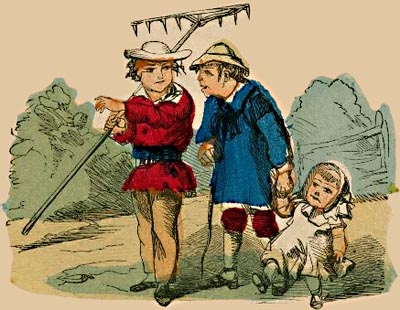
Willy boy, Willy boy, where are you going?
I will go with you, if I may.
I am going to the meadows, to see them mowing,
I am going to see them make the hay.
Little Robin Red-breast sat upon a rail,
Niddle, naddle, went his head, wiggle, waddle, went his tail;
Little Robin Red-breast sat upon a bridle,
With a pair of speckle legs, and a green girdle.
Ding, dong, darrow,
The cat and the sparrow,
The little dog burnt his tail,
And he shall be whipped to-morrow.
Pit, pat, well-a-day,
Little Robin flew away;
Where can little Robin be?
But up in yon cherry tree.
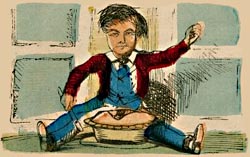
Lit-tle Jack Hor-ner sat in a cor-ner,
Eat-ing a Christ-mas pie;
He put in his thumb, and he took out a plum,
And said, “What a good boy am I!”
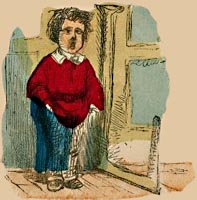
it-tle Tom Tuck-er
Sings for his sup-per;
What shall he eat?
White bread and but-ter.
How shall he cut it
With-out e’er a knife?
How will he be mar-ri-ed
With-out e’er a wife?
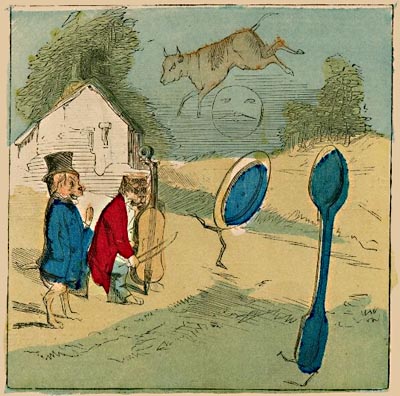
Hey diddle diddle, the cat and the fiddle,
The cow jumped over the moon,
The little dog laughed to see such sport,
And the dish ran after the spoon.
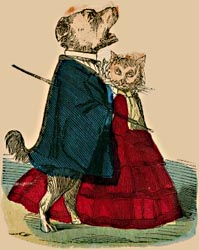
A dog and a cat went out together,
To see some friends just out of town;
Said the cat to the dog,
“What d’ye think of the weather?”
“I think, Ma’am, the rain will come down:
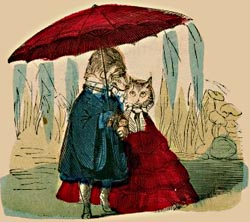
“But don’t be alarmed, for I’ve an umbrella
That will shelter us both,” said this amiable fellow.
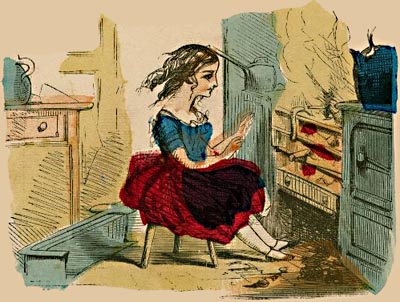
Little Polly Flinders
Sat among the cinders
Warming her pretty little toes!
Her mother came and caught her,
And whipped her little daughter,
For spoiling her nice new clothes.
Four and twen-ty tai-lors went to kill a snail,
The best man a-mongst them durst not touch her tail.
She put out her horns, like a lit-tle Ky-loe Cow.
Run, Tai-lors, run, or she’ll kill you all just now.
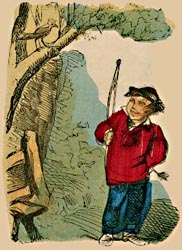
A little cock-sparrow sat on a tree,
Looking as happy as happy could be,
Till a boy came by, with his bow and arrow,
Says he, I will shoot the little cock-sparrow.
His body will make me a nice little stew,
And his giblets will make me a little pie, too.
Says the little cock-sparrow, I’ll be shot if I stay,
So he clapped his wings, and flew away.
Bless you, bless you, bonny bee;
Say, when will your wedding be?
If it be to-morrow day,
Take your wings and fly away.
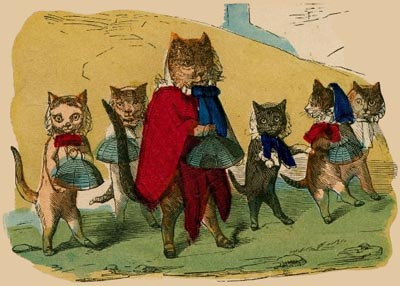
One day, an old cat and her kittens
Put on their bonnets and mittens,
And as it was damp, why they put on their clogs;
They thought it would be very nice
To go out in search of some mice,—
But they ran home again when they saw two fierce dogs.
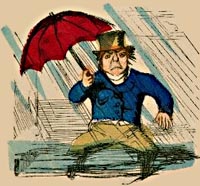
Doctor Foster went to Gloster,
In a shower of rain;
He stepped in a puddle, up to the middle,
And never went there again.
John Cook had a little gray mare; he, haw, hum!
Her back stood up, and her bones they were bare; he, haw, hum!
John Cook was riding up Shuter’s bank; he, haw, hum!
And there his nag did kick and prank; he, haw, hum!
John Cook was riding up Shuter’s hill; he, haw, hum!
His mare fell down and she made her will; he, haw, hum!
The bridle and saddle were laid on the shelf; he, haw, hum!
If you want any more you may sing it yourself; he, haw, hum!
Dingty, diddlety, my mammy’s maid,
She stole oranges, I am afraid;
Some in her pocket, some in her sleeve,
She stole oranges, I do believe.
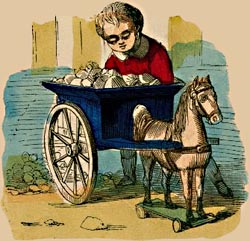
A horse and cart
Had Billy Smart,
To play with when it pleased him;
The cart he’d load
By the side of the road,
And be happy if no one teased him.
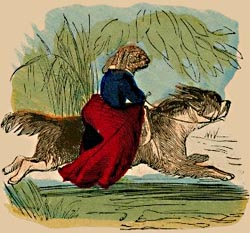
Who ever saw a rabbit
Dressed in a riding habit,
Gallop off to see her friends, in this style?
I should not be surprised
If my lady is capsized,
Before she has ridden half a mile.
Boys and girls, come out to play,
The moon does shine as bright as day,
Leave your supper, and leave your sleep,
And meet your play-fellows in the street;
Come with a whoop, and come with a call,
And come with a good will, or not at all.
Up the ladder and down the wall,
A half-penny roll will serve us all.
You’ll find milk and I’ll find flour,
And we’ll have pudding in half an hour.
Jog on, jog on, the footpath way,
And merrily jump the stile, boys,
A merry heart goes all the day,
Your sad one tires in a mile, boys.
Hush-a-bye, baby, upon the tree top,
When the wind blows the cradle will rock,
When the bough breaks the cradle will fall,
Down tumble cradle and baby and all.
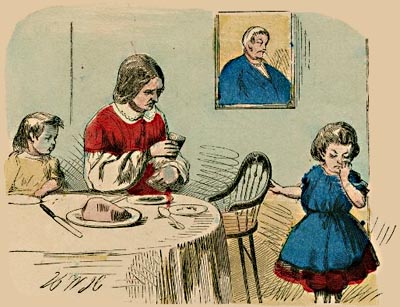
DINNER.
Miss Kitty was rude at the table one day,
And would not sit still on her seat;
Regardless of all that her mother could say,
From her chair little Kitty kept running away,
All the time they were eating the meat.
As soon as she saw that the meat was remov’d
She ran to her chair in great haste;
But her mother such giddy behavior reprov’d,
By sending away the sweet pudding she lov’d,
Without giving Kitty one taste.
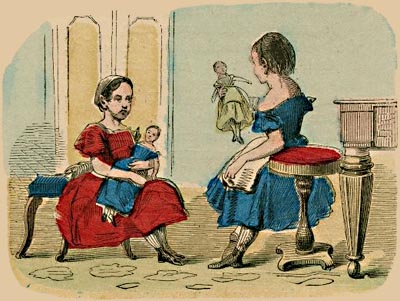
THE NEW DOLL.
Miss Jenny and Polly
Had each a new Dolly,
With rosy-red cheeks and blue eyes,
Dress’d in ribands and gauze:
And they quarreled because
The Dolls were not both of a size.
O silly Miss Jenny!
To be such a ninny,
To quarrel and make such a noise!
For the very same day
Their mama sent away
Their dolls with red cheeks and blue eyes.
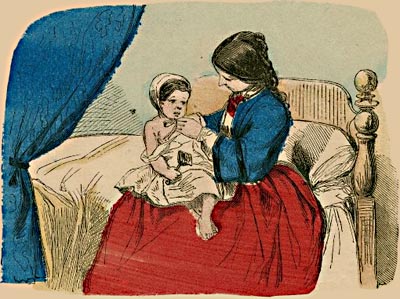
GETTING UP.
Baby, baby, ope your eye,
For the sun is in the sky,
And he’s peeping once again
Through the frosty window pane;
Little baby, do not keep
Any longer, fast asleep.
There now, sit in mother’s lap,
That she may untie your cap,
For the little strings have got
Twisted into such a knot;
Ah! for shame,—you’ve been at play
With the bobbin, as you lay.
There it comes,—now let us see
Where your petticoats can be;
O,—they’re in the window seat,
Folded very smooth and neat:
When my baby older grows
She shall double up her clothes.
Now one pretty little kiss,
For dressing you so neat as this,
And before we go down stairs,
Don’t forget to say your pray’rs,
For ’tis God who loves to keep
Little babies in their sleep.
The Linnet’s Nest.
Quick from the garden, Charles ran in,
With look of joy, and voice of glee;
A Linnet’s nest, Papa, I’ve seen:
O come—’tis in the Apple-tree.
Four little birds I just could see,
And then I ran to tell you here:
For Puss was waiting near the tree,
And she will get them all, I fear.
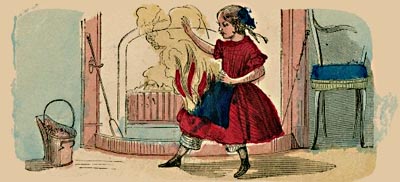
PLAYING WITH FIRE.
I’ve seen a little girl, mama,
That had got such a dreadful scar,
All down her arms, and neck, and face,
I could not bear to see the place.
Poor little girl, and don’t you know
The shocking trick that made her so?
’Twas all because she went and did
A thing her mother had forbid.
For, once, when nobody was by her,
This silly child would play with fire;
And long before her mother came,
Her pin-a-fore was all in flame!
In vain she tried to put it out,
’Till all her clothes were burnt about,
And then she suffered ten times more,
All over with the dreadful sore.
For many months, before ’twas cured,
Most shocking torments she endured;
And even now in passing by her,
You see what ’tis to play with fire!
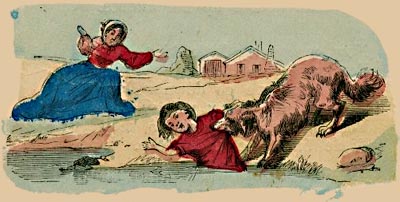
GRATEFUL LUCY.
As Lucy with her Mother walked,
She played and gamboled, laughed and talked
’Till, coming to the river side,
She slipped, and floated down the tide.
Her faithful Carlo being near,
Jumped in to save his mistress dear;
He drew her carefully to shore,
And Lucy lives and laughs once more.
Dear generous Carlo, Lucy said,
You ne’er shall want for meat or bread;
For every day before I dine,
Good Carlo shall have some of mine.
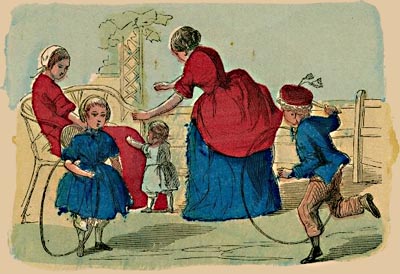
RUN AND PLAY.
There, run away, you little things,
And romp, and jump, and play,
You have been quiet long enough,
So run away, I say.
George, you and Lucy roll your hoops,
You on a stick can ride,
And nurse, with baby, run a race,
Or any play beside.
Or you may play at hounds and hare,
And chase it round and round,
But, as a fall may often chance,
Go on the grassy ground.
Or, if you like, beneath the hedge
To gather wild flowers fair,
Go, get your baskets, but be quick,
And I will meet you there.
And afterwards, Papa will make
One in your little play,
And he will try to run as fast
As you did yesterday.
The fresh, fresh air, so softly blows,
And there shines out the sun,
And active limbs and rosy cheeks
Will in the race be won.
For little boys and girls may romp,
And frisk, and jump, and play,
When book and lessons both are done,
So run away, I say.
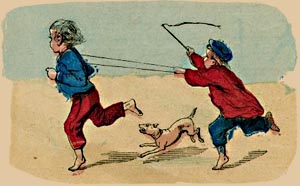
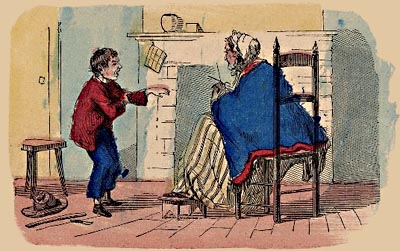
THE CUT.
Well, what’s the matter? there’s a face,
What, has it cut a vein?
And it is quite a shocking place;
Come, let us look again.
I see it bleeds, but never mind
That tiny little drop;
I don’t believe you’ll ever find
That crying makes it stop.
’Tis sad, indeed, to cry at pain,
For any but a baby;
If that should chance to cut a vein,
We should not wonder, may be.
But such a man as you should try
To bear a little sorrow:
So run along, and wipe your eye,
’Twill all be well to-morrow.
SLEEPY HARRY.
I do not like to go to bed,
The sleepy little Harry said;
So, naughty Betty, go away,
I will not come at all, I say.
What a silly little fellow!
I should be asham’d to tell her.
Betty, you must come and carry
Very foolish little Harry.
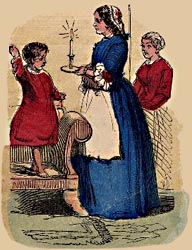
The little birds are better taught,
They go to roosting when they ought;
And all the ducks and fowls you know
They went to bed an hour ago.
The little beggar in the street,
Who wanders with his naked feet,
And has not where to lay his head,
O, he’d be glad to go to bed.
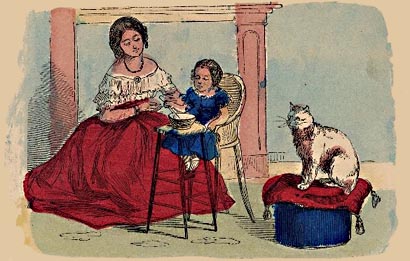
BREAKFAST AND PUSS.
Here’s my baby’s bread and milk,
For her lip as soft as silk;
Here’s the basin, clean and neat;
Here’s the spoon of silver sweet;
Here’s the stool, and here’s the chair
For my little lady fair.
No, you must not spill it out,
And drop the bread and milk about;
But let it stand before you flat,
And pray, remember pussy cat;
Poor old pussy cat that purrs
All so patiently for hers.
True she runs about the house,
Catching, now and then, a mouse.
But, though she thinks it very nice,
That only makes a tiny slice;
She don’t forget, that you should stop,
And leave poor puss a little drop.
Frightened by a Cow.
A very young lady,
With Susan the maid,
Who carried the baby,
Were one day afraid.
They saw a cow feeding,
Quite harmless and still,
Yet screamed without heeding
The man at the mill.
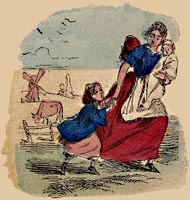
Who seeing their flutter,
Said, “cows do no harm,
But give you good butter
And milk from the farm.”
“So don’t have the folly
Of running at sight
Of a gentle old Mooly,
In terror and fright.”
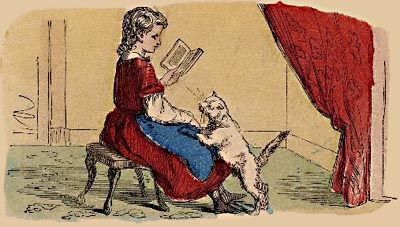
THE DUNCE OF A KITTEN.
Come, pussy, will you learn to read.
I’ve got a pretty book?
Nay, turn this way, you must indeed.—
Fie, there’s a sulky look.
Here is a pretty picture, see,
An apple, and great A:
How stupid you will ever be,
If you do naught but play.
Come, A, B, C, an easy task,
What any fool can do:
I will do any thing you ask,
For dearly I love you.
Now, how I’m vexed, you are so dull,
You have not learnt it half:
You will grow up a downright fool,
And make all people laugh.
Mother so told me, I declare,
And made me quite ashamed;
So I resolved no pains to spare,
Nor like a dunce be blamed.
Well, get along, you naughty Kit,
And after mice go look;
I’m glad that I have got more wit,
I love my pretty book.
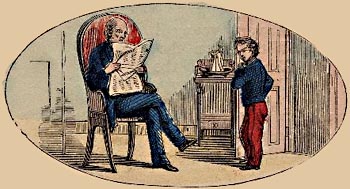
SENSIBLE CHARLES.
When Charles was only ten years old,
His uncle took him to the play;
The night was bad, he caught a cold,
And laid in bed the following day.
When Charles was well enough to rise,
He gently ope’d his uncle’s door;
And, to his very great surprise,
Begged he would take him there no more.
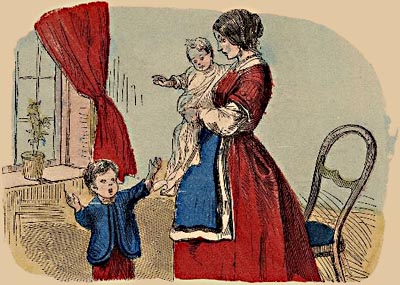
PUT DOWN THE BABY.
“O dear Mama,” said little Fred,
“Put baby down—take me instead;
Upon the carpet let her be
Put baby down, and take up me.”
No, that, my dear, I cannot do,
You know I used to carry you;
But you are now grown strong and stout,
And you can run and play about.
When Fanny is as old as you,
No doubt but what she’ll do so too;
And when she grows a little stronger,
I mean to carry her no longer.
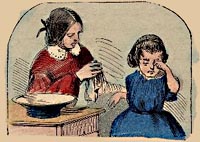
DIRTY HANDS.
O bless me, Mary, how is this?
Your hands are very dirty, Miss;
I don’t expect such hands to see
When you come in to dine with me.
Mama, said little Mary, pray,
Shall we have company to-day
That I should be so very clean?
By whom, pray, am I to be seen?
By whom, my girl? why, by Mama,
By Brothers, Sisters, and Papa;
Pray, do you not most love to see
Your parents, and your family?
Be cleanly and polite at home,
Then you’re prepared if friends should come:
Make it your habit to be clean,
No matter then by whom you’re seen.
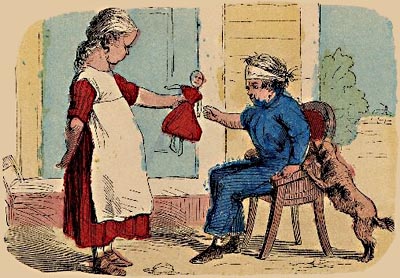
FRANCES AND HENRY.
Sister Frances is sad,
Because Henry is ill;
And she lets the dear lad
Do whatever he will will.
Left her own little chair
And got up in a minute,
When she heard him declare
That he wished to sit in it.
Now from this we can tell,
He will never more tease her,
But when he is well,
He will study to please her.
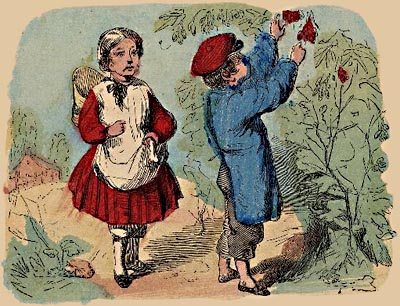
POISONOUS FRUIT.
As Tommy and his sister Jane
Were walking down a shady lane,
They saw some berries, bright and red,
That hung around and over head.
And soon the bough they bended down
To make the scarlet fruit their own;
And part they ate, and part in play
They threw about and flung away.
But long they had not been at home
Before poor Jane and little Tom
Were taken sick and ill, to bed,
And since, I’ve heard, they both are dead.
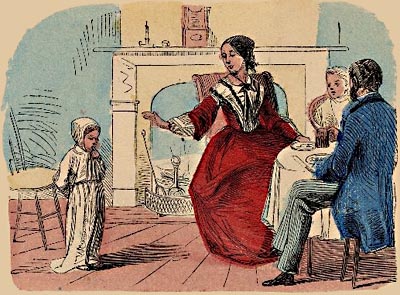
DRESSED OR UNDRESSED.
When children are naughty, and will not be drest,
Pray, what do you think is the way?
Why, often I really believe it is best
To keep them in night-clothes all day!
But then they can have no good breakfast to eat,
Nor walk with their mother or aunt,
At dinner they’ll have neither pudding nor meat,
Nor any thing else that they want.
Then who would be naughty and sit all the day
In night-clothes unfit to be seen?
And pray who would lose all their pudding and play,
For not being dress’d neat and clean.
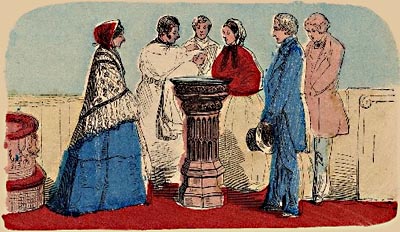
BAPTISM IN CHURCH.
Frances Lorenzo is my name,
I scarce can tell you how it came;
(One day to church I had to go,
And ever since they’ve called me so.)
That New Year’s day I shan’t forget,
So cold, my limbs seem shaking yet;
Nor him who loves the lambs, they said,
And poured the water on my head.
For folded in his bosom warm,
I knew that I was safe from harm;
He called my name, and pressed my brow,
And said, I was a soldier now.
I sat so still, and all around
Were pleasant looks and sweetest sound;
I wondered what it all could mean,
O, Mama, take me there again.a. d. f.
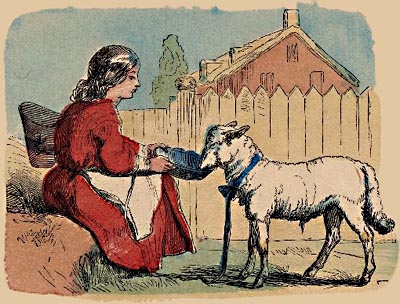
THE PET LAMB.
My own pet Lamb, I long to be
From envy, pride, and malice free;
Patient, and mild, and meek like thee,
My own pet Lamb.
I long to know my Shepherd’s voice,
To make his pleasant ways my choice
And in the fold like thee rejoice,
My own pet Lamb.
Be you to others kind and true,
As you’d have others be to you.
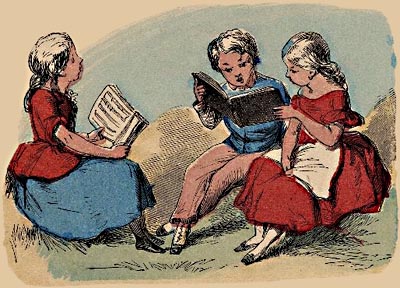
HYMN.
O, Lord! our infant voice we raise,
Thy holy name to bless;
In daily song of thanks and praise,
For mercies numberless.
For parents who have taught us right,
That Thou art good and true;
And though unseen by our weak sight
Thou seest all we do.
Let all our thoughts and actions rise
From innocence and truth;
And Thou, O, Lord! wilt not despise
The praise of early youth.
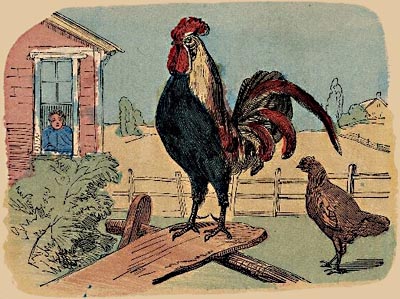
TIME TO RISE.
The Cock who soundly sleeps at night,
Rises with the morning light,
Very loud and shrill he crows;
Then the sleeping ploughman knows,
He must leave his bed also,
To his morning work to go.
And the little Lark does fly
To the middle of the sky;
You may hear his merry tune
In the morning very soon;
For he does not like to rest,
Idle, in his downy nest.
While the cock is crowing shrill,
Leave my little bed I will,
And I’ll rise to hear the Lark,
For it is no longer dark;
’Twould be a pity there to stay,
When ’tis light and pleasant day.
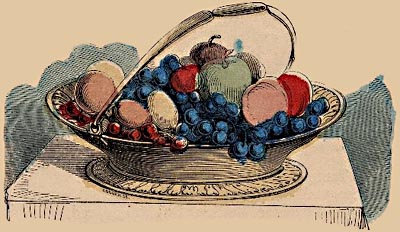
FOR NANNIE.
A plum so blue, a cherry red,
An orange bright and yellow;
A pippin green, as e’er was seen,
And peaches rich and mellow.
All, all of these will mama give
To lassie good and bonnie, O,
So papa down, to Boston town,
And buy them all for Nannie, O.
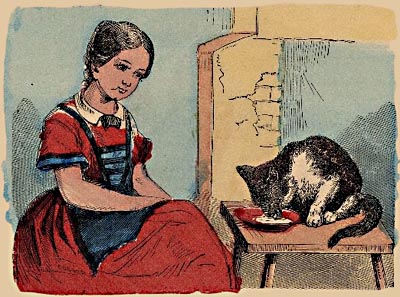
THE PUSSY CAT.
Little puss, come here to me,
Gently jump upon my knee,
And then your pretty eyes I’ll see,
But do not scratch.
Pray do you ever catch a mouse,
As you run up and down the house?
I’m sure you do, good Mrs. Puss,
With these same claws.
Here, share with me this little seat,
I never now poor puss will beat,
So let me feel how soft your feet,
Since you don’t scratch.
How very nicely you can draw,
Quite out of sight each little claw,
And make so soft a velvet paw,
Good little puss.
I saw a little mouse, you know,
Once yonder in the yard below,
And pounce you went upon it so,
Poor little thing.
You loosed it oft, and let it run,
Then to pursue it you begun,
And seemed to think it made good fun,
You cruel puss.
But do not tease it so, I pray,
Because I’ve heard papa oft say,
It was a very cruel way,
And should not be.
So, pussy, you must kill it quite,
Not put it in so great a fright,
And seem to glory in the sight;
Do you hear, puss?
Give to the Father praise,
Give glory to the Son;
And to the Spirit of His Grace,
Be equal honor done.
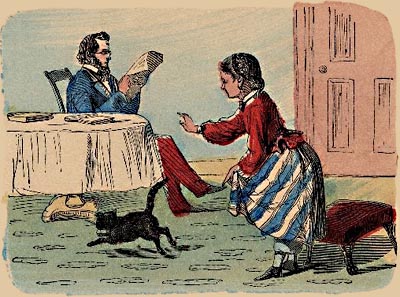
THE FROLICSOME KITTEN.
Dear kitten, do lie still, I say,
I really want you to be quiet,
Instead of scampering away,
And always making such a riot!
There, only see you’ve torn my frock,
And poor mama must put a patch in;
I’ll give you a right earnest knock,
To cure you of this trick of scratching.
——Nay do not scold your little cat,
She does not know what ’tis you’re saying.
And ev’ry time you give a pat,
She thinks you mean it all for playing.
But if your pussy understood
The lesson that you want to teach her,
And did she choose to be so rude,
She’d be indeed a naughty creature.
Penance for beating a Brother.
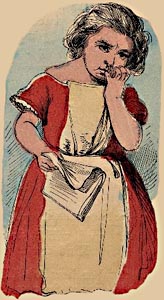
A little girl I knew,
Who looked extremely mild;
And many thought her too
A very clever child.
But ah, one fault she had,
Although her face was pretty
Her temper it was bad;
And was not that a pity?
Both absent were one day
Her Father and her Mother
And then, I grieve to say,
She beat her little brother.
The Nurse then thought it right,
For beating little Fred,
(Although it was not night)
To put her into bed.
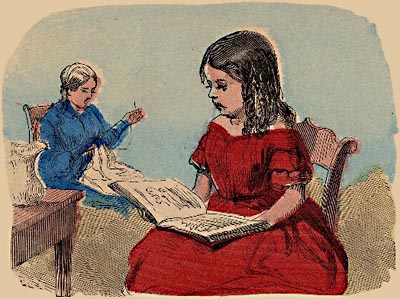
THE NEW BOOK.
Mama, see what a pretty book
My dear papa has brought,
That I may at the pictures look,
And by the words be taught.
He knew I had been good, you said,
And had learnt all my spelling;
I’m very much obliged to you,
My dear mama, for telling.
And that when I am better taught,
And read with greater ease,
Some more new books shall then be bought,
His little girl to please.
My dear papa, he is so kind,
I dearly love a book;
And dearly too, I love to find
These pictures—pray do look!
And, O, dear, if I could but read
As fast as I can spell,
How very happy I should be,
I love to read so well.
I know mama, you’ll tell me that
To practice is the way,
So will you kindly let me, now,
Another lesson say.
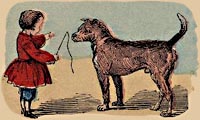
THE DOG.
O, don’t hurt the Dog, poor honest old Tray,
What good will it do you to drive him away?
Kind treatment is justly his right.
Remember how faithful he is to his charge,
And barks at the rogues when we set him at large,
And guards us by day and by night.
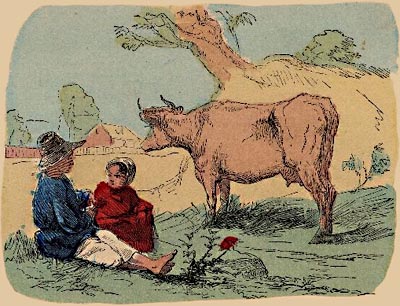
THE COW.
Thank you, pretty Cow, that made
Pleasant milk, to soak my bread;
Every day, and every night,
Warm, and fresh, and sweet, and white.
Do not chew the hemlock rank,
Growing on the weedy bank;
But the yellow cowslips eat,
They will make it very sweet.
Where the purple violet grows,
Where the bubbling water flows,
Where the grass is fresh and fine,
Pretty Cow, go there and dine.
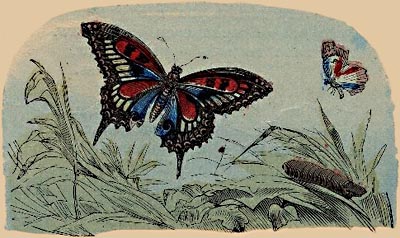
THE BUTTERFLY.
See yonder painted Butterfly,
How gaudily it soars on high,
And seems to wish to reach the sky.
Late it was an insect mean,
Crawling o’er the shaven green,
Or on the cabbage leaves was seen.
And thus, my child, is man on earth,
A thing of mean and mortal birth;
His life a span; his power a breath.
But his immortal better part
Into a higher world will start,
When death his soul and body part.
And then he will glorious rise
With body fitted to the skies,
An Angel’s form, not Butterfly’s!
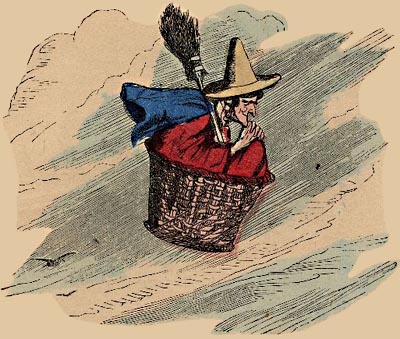
There was an old wo-man tos-sed up in a bas-ket,
Nine-ty times as high as the moon;
And where she was go-ing, I could-n’t but ask her,
For in her hand she car-ried a broom.
“Old wo-man, old wo-man, old wo-man,” quoth I,
“Whi-ther, O whi-ther, O whi-ther so high?”
“To sweep the cob-webs off the sky!”
“Shall I go with you?” “Aye, by-and-by.”
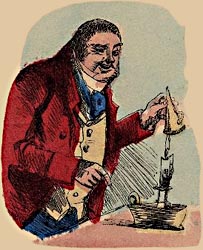
To make your candles last for a’,
You wives and maids give ear-o!
To put them out ’s the only way,
Says honest John Boldero.
A milking, a milking, my maid,
“Cow, take care of your heels,” she said;
“And you shall have some nice new hay,
If you’ll quietly let me milk away.”
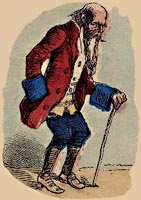
Old father Grey Beard,
Without tooth or tongue;
If you’ll give me your finger,
I’ll give you my thumb.
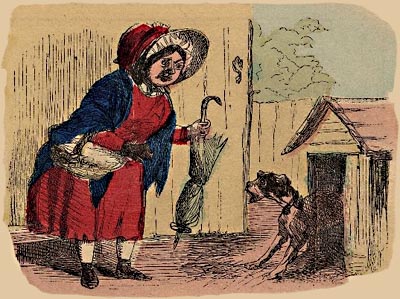
There was an old woman, as I’ve heard tell,
She went to market her eggs for to sell;
She went to market all on a market day,
And she fell asleep on the king’s highway.
There came by a pedlar, whose name was Stout,
He cut her petticoats all round about;
He cut her petticoats up to the knees,
Which made the old woman to shiver and freeze.
When the little old woman first did wake,
She began to shiver and she began to shake;
She began to wonder, and she began to cry,
“Lauk a mercy on me, this can’t be I!”
But if it be I, as I hope it be,
I’ve a little dog at home, and he’ll know me;
If it be I, he’ll wag his little tail,
And if it be not I, he’ll loudly bark and wail.
Home went the little woman all in the dark,
Up got the little dog, and he began to bark;
He began to bark, so she began to cry,
“Lauk a mercy on me, this is none of I.”
Bye, baby bunting,
Father’s gone a hunting,
Mother’s gone a milking,
Sister’s gone a silking,
Brother’s gone to buy a skin
To wrap the baby bunting in.
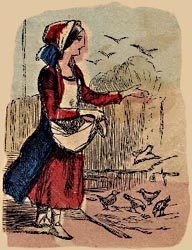
Away Birds, away!
Take a little, and leave a little,
And do not come again;
For if you do,
I will shoot you through,
And then there will be an end of you.
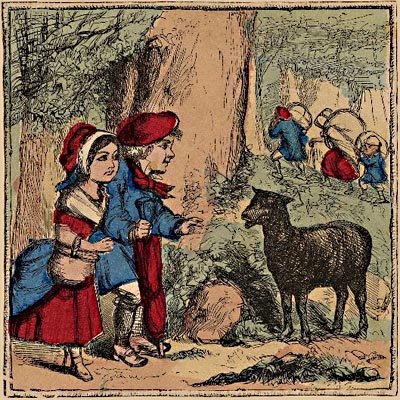
Ba-a, ba-a, black sheep,
Have you any wool?
Yes, sir, yes, sir,
Three bags full:
One for my mas-ter,
One for my dame,
And one for the lit-tle boy
That lives in our lane.
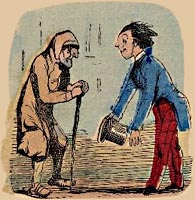
One mis-ty morn-ing,
When clou-dy was the wea-ther,
I met a lit-tle old man,
Cloth-ed all in lea-ther,
Cloth-ed all in lea-ther,
With a strap be-low his chin.
How do you do? and how do you do?
And how do you do a-gain?
Dee-dle, dee-dle, dump-ling, my son John,
He went to bed with his stock-ings on;
One shoe off, and one shoe on.
Dee-dle, dee-dle, dump-ling, my son John.
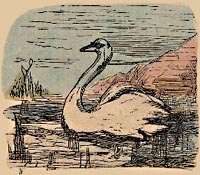
Swan, swan, over the sea;
Swim, swan, swim.
Swan, swan, back again;
Well, swan, swam.
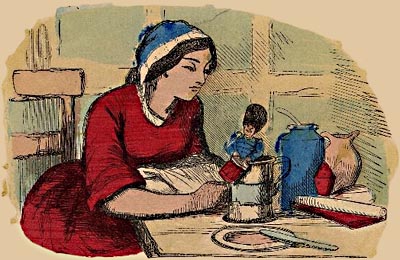
I had a lit-tle Hus-band, no big-ger than my thumb;
I put him in a pint-pot, and there I bid him drum.
I bought a lit-tle horse that gal-lop-ed up and down;
I sad-dled him and bri-dled him, and sent him out of town.
I gave him some gar-ters, to gar-ter up his hose,
And a lit-tle pock-et hand-ker-chief to wipe his pretty nose.
Ma-ry, Ma-ry, quite con-tra-ry,
How does your gar-den grow?
Sil-ver bells and coc-kle shells,
And pret-ty maids all in a row.
Hey, my kit-ten, my kit-ten,
Hey, my kit-ten, my deary;
Such a sweet pet as this
Was nei-ther far nor neary.
Here we go up, up, up,
Here we go down, down, downy;
Here we go back-wards and for-wards,
And here we go round, round, roundy.
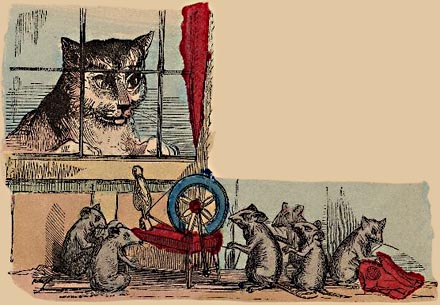
Some lit-tle mice sat in a barn to spin.
Pus-sy came by, and she pop-ped her head in;
“Shall I come in and cut your threads off?”
“Oh no, kind sir, you will snap our heads off.”
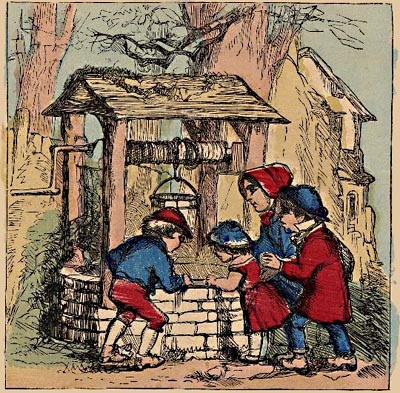
Ding, dong, bell, Pus-sy’s in the well.
Who put her in? Lit-tle Tom-my Green.
Who pull-ed her out? Lit-tle Tom-my Trout.
What a naugh-ty boy was that,
To drown poor Pus-sy Cat.
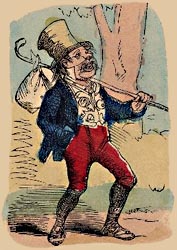
As I was going along, long, long,
A singing a comical song, song, song,
The lane that I went was so long, long, long,
And the song that I sung was so long, long, long,
And so I went singing along.
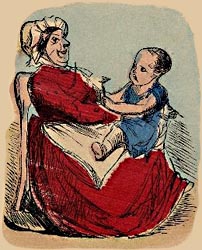
Dance a baby diddit,
What can a mother do with it,
But sit in a lap,
And give him some pap,
Dance a baby diddit.
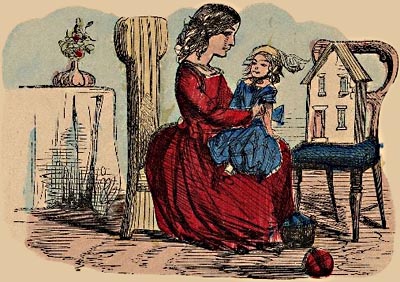
Hush, baby, my doll, I pray you, don’t cry,
And I’ll give you some bread, and some milk by-and-bye;
Or perhaps you like custard, or, maybe, a tart,
Then to either you are welcome, with all my heart.
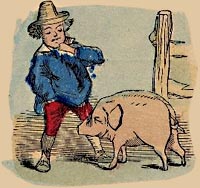
Jack Spratt’s pig,
He was not very little,
Nor yet very big;
He was not very lean,
He was not very fat,
He’ll do well for a grunt,
Says little Jack Sprat.
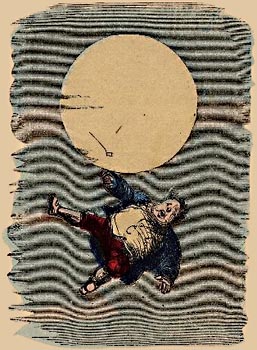
The man in the moon,
Came tumbling down,
And asked the way to Norwich.
He went by the south,
And burnt his mouth,
With eating cold pease porridge.
There was an old wo-man, and what do you think?
She liv-ed up-on no-thing but vic-tuals and drink;
Vic-tuals and drink were the chief of her diet,
Yet the pla-guey old wo-man could ne-ver be qui-et.
She went to the ba-ker’s to buy some bread;
And when she came home, her hus-band was dead.
She went to the clerk, to toll the great bell;
And when she came back, her hus-band was well.
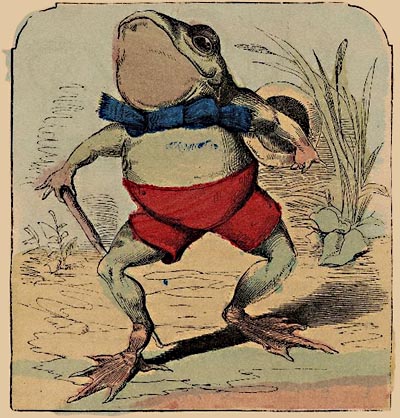
A Frog he would a-wooing go,
Sing, heigho, says Rowley;
Whether his mother would let him or no:
With a rowley, powley, gammon and spinach;
Heigho, says Anthony Rowley.
So off he marched with his opera-hat,
Heigho, says Rowley;
And on the way he met with a rat,
With a rowley, powley, &c.
And when they came to mouse’s hall,
Heigho, says Rowley;
They gave a loud knock, and they gave a loud call,
With a rowley, powley, &c.
“Pray, Mrs. Mouse, are you within?”
Heigho, says Rowley;
“Yes, kind sir, I am sitting to spin,”
With a rowley, powley, &c.
“Pray, Mrs. Mouse, will you give us some beer?”
Heigho, says Rowley;
“For Froggy and I are fond of good cheer,”
With a rowley, powley, &c.
Now while they all were a merry making,
Heigho, says Rowley;
The cat and her kittens came tumbling in,
With a rowley, powley, &c.
The cat she seized the rat by the crown,
Heigho, says Rowley;
The kittens they pulled the little mouse down,
With a rowley, powley, &c.
This put poor frog in a terrible fright,
Heigho, says Rowley;
So he took up his hat, and he wished them good night,
With a rowley, powley, &c.
But as Froggy was crossing over a brook,
Heigho, says Rowley;
A lily-white duck came and gobbled him up,
With a rowley, powley, &c.
So there was an end of one, two, and three,
Heigho, says Rowley;
The rat, the mouse, and the little Frog-ee!
With a rowley, powley, gammon and spinach;
Heigho, says Anthony Rowley.
Here am I, little jumping Joan,
When nobody’s with me, I’m always alone.
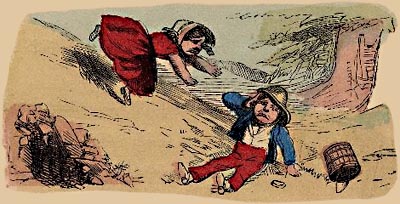
Jack and Gill went up the hill,
To fetch a pail of wa-ter;
Jack fell down, and broke his crown,
And Gill came tum-bling af-ter.
Up Jack got and home did trot,
As fast as he could ca-per;
Dame Gill had the Job to plais-ter his knob,
With vin-e-gar and brown paper.
Pus-sy cat, pus-sy cat, where have you been?
I’ve been to Lon-don to look at the Queen.
Pus-sy cat, pus-sy cat, what did you do there?
I fright-en-ed a lit-tle mouse un-der the chair.
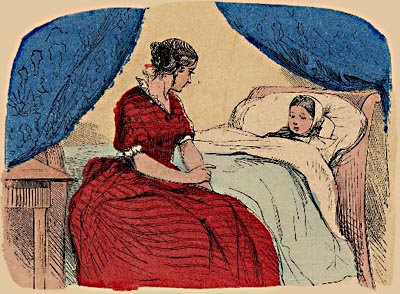
GOOD NIGHT.
Baby, baby, lay your head
On your pretty little bed;
Shut your eye-peeps, now the day
And the light are gone away;
All the clothes are tuck’d in tight,
Little baby dear, good night.
Yes, my darling, well I know
How the bitter wind doth blow
And the winter’s snow and rain
Patter on the window pane;
But they cannot come in here
To my little baby dear.
For the curtains warm are spread
Round about her cradle-bed;
And her little night-cap hides
Every breath of air besides;
So ’till morning shineth bright,
Little baby dear, good night.
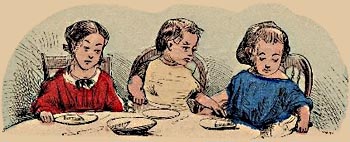
HOT APPLE PIE.
As Charles his sisters sat between
An Apple Pie was brought;
Slily to get a piece unseen,
The little fellow thought.
A piece from off Sophia’s plate
Into his mouth he flung;
But, ah! repentance came too late,
It burn’d his little tongue.
The tears ran trickling down his cheek,
It put him to such pain;
He said (as soon as he could speak)
“I’ll ne’er do so again.”
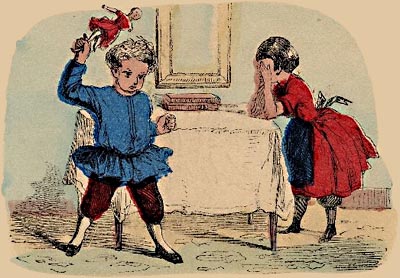
LUCY AND DICKY.
Miss Lucy was a charming child.
She never said, I won’t!
If little Dick her playthings spoiled,
She said pray, Dicky, don’t!
He took her waxen doll one day,
And banged it round and round,
Then tore its legs and arms away,
And threw them on the ground.
His good mama was angry quite,
And Lucy’s tears ran down;
But Dick went supperless that night,
And since has better grown.
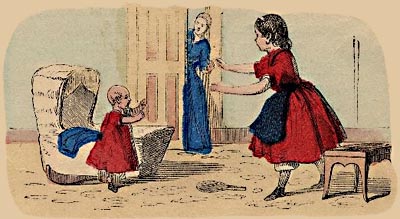
THE FAIRY MAN.
Oh, dear Mama, where have you gone?
Come here, the baby stands alone;
And only think, indeed ’tis truth,
He has, just feel, a little tooth.
Look at his pretty shining hair,
His cheek so red, his skin so fair,
His curly ringlets, just like flax,
His little bosom, just like wax.
Oh, how I long ’till he can walk;
And then I’ll long ’till he can talk;
And then I’ll long ’till he can play,
When we have said our tasks each day.
I think he’s growing very wise,
Now, don’t you think so? Julia cries.
Then to the cradle off she ran,
To kiss the little fairy man.
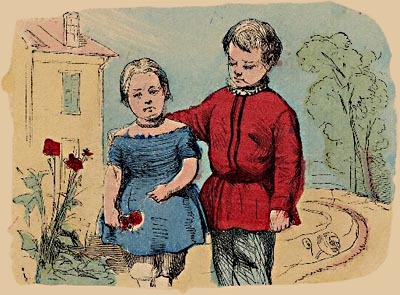
COME PLAY IN THE GARDEN.
Little sister, come away,
And let us in the garden play,
For it is a pleasant day.
On the grass-plat let us sit,
Or, if you please, we’ll play a bit,
And run about all over it.
But the fruit we will not pick,
That would be a naughty trick,
And, very likely, make us sick.
Nor will we pluck the pretty flowers,
That grow about the beds and bowers.
Because, you know, they are not ours.
We’ll pluck the daisies, white and red,
Because mama has often said,
That we may gather them instead.
And much I hope we always may
Our very dear mama obey,
And mind whatever she may say.
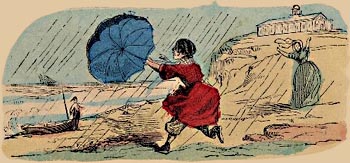
THE UMBRELLA.
Once as little Isabella
Ventured, with a large Umbrella,
Out upon a rainy day,
She was nearly blown away.
Sadly frighten’d then was she,
For ’twas very near the sea,
And the wind was very high,
But, alas! no friend was nigh.
Luckily, her good Mama
Saw her trouble from afar;
Running just in time, she caught her
Pretty little flying daughter.
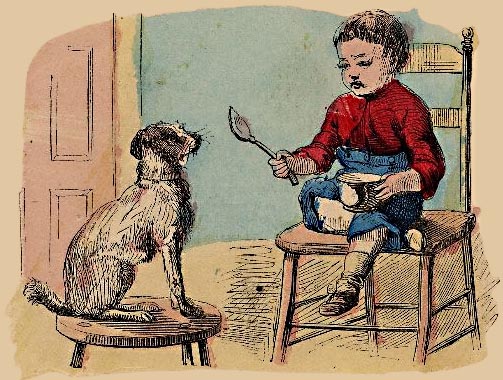
NO BREAKFAST FOR GROWLER.
No, naughty Growler, get away,
You shall not have a bit;
Now when I speak, how dare you stay!
I can’t spare any, sir, I say
And so you need not sit.
Poor Growler! do not make him go
But recollect, before,
That he has never serv’d you so,
For you have given him many a blow
That patiently he bore.
Poor Growler! if he could speak,
He’d tell, (as well he might,)
How he would bear with many a freak,
And wag his tail and look so meek,
And neither bark nor bite.
Clever Little Thomas.
When Thomas Poole first went to school,
He was but scarcely seven;
Yet knew as well to read and spell,
As most boys of eleven.
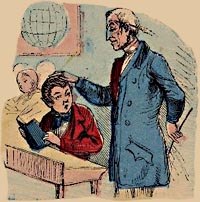
He took his seat, and wrote quite neat,
And never idly acted;
And then, beside, he multiplied,
Divided and subtracted.
His master said, (and strok’d his head),
“If thus you persevere,
“My little friend you may depend
“Upon a Prize next year.”
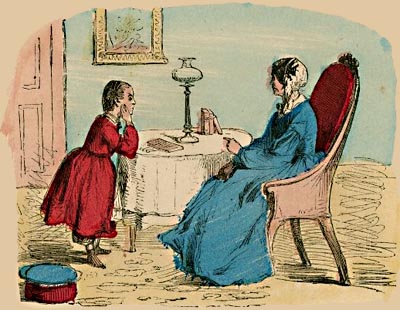
SULKING.
Why is Mary standing idle,
Leaning down upon the table,
With pouting lip, and frowning brow?
I wonder what’s the matter now!
Come here, my dear, and tell me true,
Is it because I scolded you
For doing work so bad and slow,
That you are standing sulking so?
Why then, indeed, I’m griev’d to see,
That you can so ill-temper’d be;
You make your faults a great deal worse,
By being angry and perverse.
O, how much better it appears,
To see you melting into tears,
And then to hear you humbly say,
I’ll not do so another day.
But when you stand and sulk about,
And look so cross, and cry and pout,
Why that, my little girl, you know,
Is worse than working bad and slow.
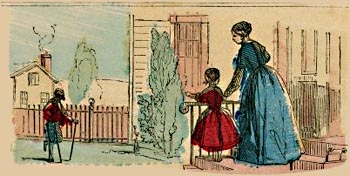
GIVING WITH PRUDENCE.
I see, Mama, said little Jane,
A beggar coming down the lane;
O, let me take him (may not I?)
This cheese-cake and some currant pie.
Your charity I much approve,
And something you may take him, love;
But let it be some bread and cheese,
Much better than such things as these.
By giving sweetmeats to the poor
Who never tasted them before,
We spoil the good we have in view,
And teach them wants they never knew.
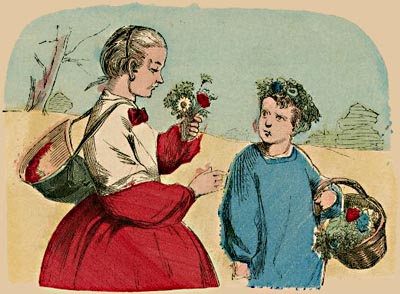
THE FIELD DAISY.
I’m a pretty little thing,
Always coming with the spring,
In the meadows green I’m found
Peeping just above the ground,
And my stalk is cover’d flat,
With a white and yellow hat
Little lady, when you pass
Lightly o’er the tender grass,
Skip about, but do not tread
On my meek and healthy head
For I always seem to say,
Chilly winter’s gone away.
THE MOUSE.
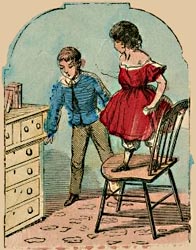
O come brother come;
I’m frightened, because
There’s a Mouse in the room,
It is under the drawers.
O silence, John said,
Do not make such a noise;
The Mouse is afraid
Of us little boys.
It is gentle and weak,
And can never do harm;
But it gives a faint squeak
At the slightest alarm.
SHORT ADVICE.
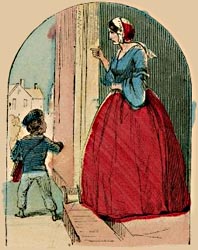
Hear,
Dear
Little Son;
Go
Slow;
Do not run.
Near
Here
Is a well;
Poor
Moore
In it fell.
Down
Town
Do not stray;
There
Dare
Not to play.
Do you
Make a rule;
Come
Home
Straight
From school.
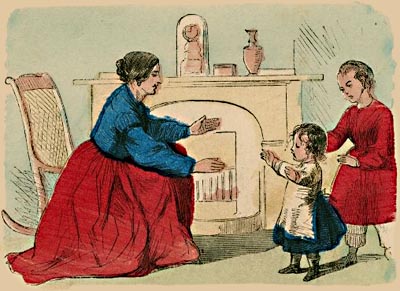
LEARNING TO GO ALONE.
Come, my darling, come away,
Take a pretty walk to-day;
Run along and never fear,
I’ll take care of baby dear;
Up and down with little feet,
That’s the way to walk, my sweet.
Now it is so very near,
Soon she’ll get to mother dear,
There she comes along at last,
Here’s my finger, hold it fast;
Now one pretty little kiss,
After such a walk as this.
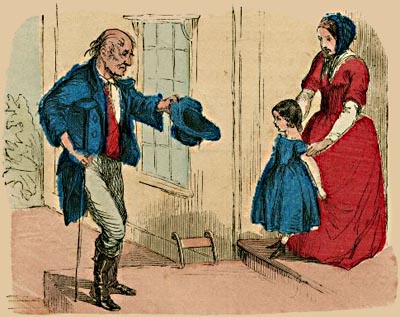
CHARITY.
Do you see that old beggar who stands at the door?
Do not send him away—we must pity the poor.
Oh, see how he shivers!—he’s hungry and cold,
For people can’t work when they grow very old.
Go, set near the fire a table and seat;
And Betty shall bring him some bread and some meat.
I hope my dear children will always be kind,
Whenever they meet with the aged and blind.
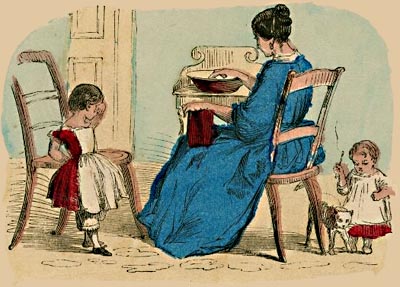
For a Little Girl that did not like to be Washed.
What! cry to be wash’d, and not love to be clean!
There go and be dirty, not fit to be seen,
And ’till you leave off, and I see you have smiled,
I won’t take the trouble to wash such a child.
Suppose I should leave you now just as you are,
Do you think you’d deserve a sweet kiss from papa?
Or to sit on his knee, and learn pretty great A,
With fingers that have not been washed all the day!
Ah, look at your fingers, you see it is so?
Did you ever behold such a little black row?
And for once you may look at yourself in the glass:
There’s a face to belong to a good little lass!
Come, come, now I see you’re beginning to clear,
You won’t be so foolish again then, my dear?
The Snow Ball.
Little Edward loved to go
Playing in the drifted snow,
Like some little boys I know;
Cold Edward!
He a solid snow ball made,
(Friendly tricks at home he played),
Which he in his pocket laid;
Wise Edward!
Very hard that day it freezed,
Very hard the ball was squeezed,
And he trotted home well pleased;
Sly Edward!
By the fire he took a seat,
Thoughtless of the power of heat,
Drops fall trickling on his feet;
Wet Edward!
Now the snow began to melt,
Vainly on the ground he knelt,
All now laughed at what he felt;
Poor Edward!
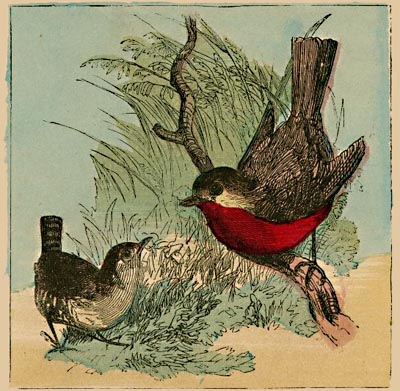
Jenny Wren fell sick upon a merry time,
In came Robin Redbreast, and brought her sops and wine.
“Eat well of the sop, Jenny, drink well of the wine.”
“Thank you, Robin, kindly, you shall be mine.”
Then Jenny she got well and stood upon her feet,
And told Robin plainly she loved him not a bit.
Robin being angry, hopp’d upon a twig,
Saying, “Out upon you, fie upon you, bold-faced jig!”
Jenny Wren fell sick again, and Jenny Wren did die;
The doctors vow’d they’d cure her, or know the reason why.
Doctor Hawk felt her pulse, and shaking his head,
Says, “I fear I can’t save her, because she’s quite dead.”
“She’ll do very well,” says sly Doctor Fox;
“If she takes but one pill from out of this box.”
With hartshorn in hand came Doctor Tomtit,
Saying, “Really, good sirs, it’s only a fit.”
“You’re right, Doctor Tit, the truth I’ve no doubt of;
But death is a fit folks seldom get out of.”
Doctor Cat says, “Indeed, I don’t think she’s dead;
I believe, if I try, she might yet be bled.”
“I think, Puss, you’re foolish,” then says Doctor Goose;
“For to bleed a dead Wren can be of no use.”
Doctor Owl then declared that the cause of her death,
He really believed, was the want of more breath.
“Indeed, Doctor Owl, you are much in the right;
You might as well have said the day is not night.”
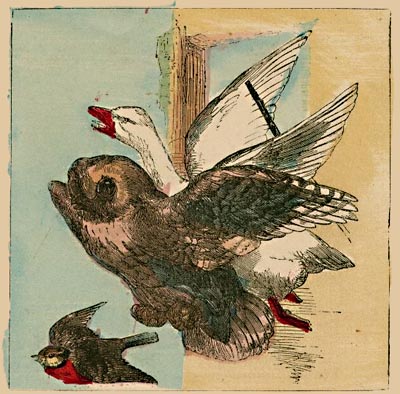
Says Robin, “Get out! you’re a parcel of quacks;
Or I’ll lay this good stick on each of your backs.”
Then Robin began to bang them about;
They staid for no fees, but were glad to get out.
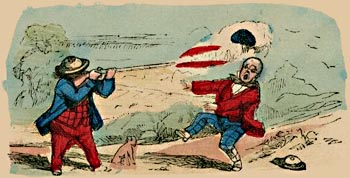
There was a lit-tle man, and he had a lit-tle gun,
And his bul-lets were made of lead, lead, lead;
He shot John-ny King through the mid-dle of his wig,
And knock-ed it right of his head, head, head.
Daf-fy-down-Dil-ly has come up to town,
In a yel-low pet-ti-coat and a green gown.
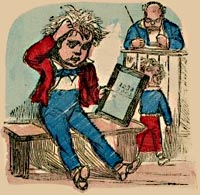
Mul-ti-pli-ca-tion is a vex-a-tion,
Di-vi-sion is as bad,
The Rule of Three per-plex-es me,
And Prac-tice drives me mad.
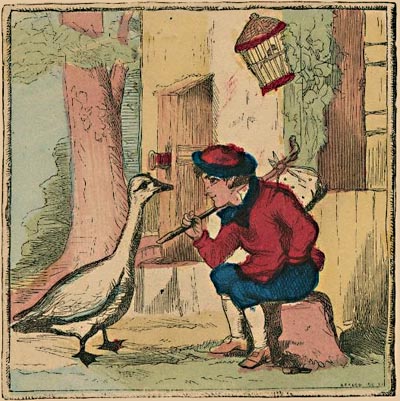
Goo-sey, goo-sey, gan-der, whi-ther shall I wan-der?
Up-stairs, and down-stairs, and in my la-dy’s cham-ber.
There I met an old man, who would not say his pray-ers;
I took him by the left leg, and threw him down stairs.
Peter, Peter, pumpkin eater,
Had a wife and couldn’t keep her;
He put her in a pumpkin shell,
And then he kept her very well.
Peter, Peter, pumpkin eater,
Had another and didn’t love her;
Peter learnt to read and spell,
And then he loved her very well.
When good King Arthur ruled his land
He was a goodly king;
He stole three pecks of barley meal
To make a bag-pudding.
A bag-pudding the king did make,
And stuff’d it well with plums;
And in it put great lumps of fat,
As big as my two thumbs.
The king and queen did eat thereof,
And noblemen beside;
And what they could not eat that night,
The queen next morning fried.
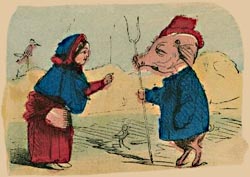
As I went to Bonner,
I met a pig,
Without a wig,
Upon my word and honor.
Pitty Patty Polt,
Shoe the wild colt;
Here a nail,
And there a nail,
Pitty Patty Polt.
Brow, brow, brinkie,
Eye, eye, winkie,
Mouth, mouth, merry,
Cheek, Cheek, Cherry,
Chin chopper, chin chopper.
Shoe the wild horse, and shoe the grey mare,
If the horse wont be shod, let him go bare.
Lady-bird, Lady-bird,
Fly away home,
Your house is on fire,
Your children will burn.
1, 2, 3, 4, 5,
I caught a hare alive.
6, 7, 8, 9, 10,
I let her go again.
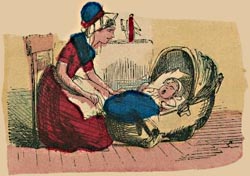
Hush-a-bye, baby,
Daddy is near;
Mamma is a lady,
And that’s very clear.
Cross patch,
Draw the latch,
Sit by the fire and spin;
Take a cup,
And drink it up,
And call your neighbors in.
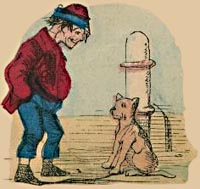
Bow-wow-wow,
Whose dog art thou?
Little Tom Tucker’s dog,
Bow-wow-wow.
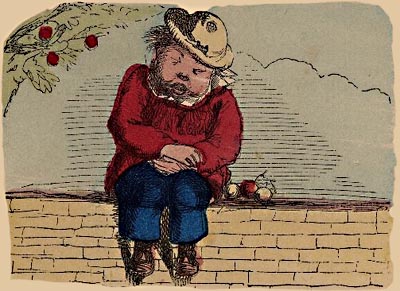
Humpty-Dumpty sat on a wall,
Humpty-Dumpty had a great fall;
All the king’s horses, and all the king’s men
Cannot put Humpty-Dumpty together again.
The Queen of Hearts
She made some tarts,
All on a summer’s day;
The Knave of Hearts,
He stole the tarts,
And took them clean away.
The King of Hearts
Called for the tarts,
And beat the Knave full sore;
The Knave of Hearts
Brought back the tarts,
And vow’d he’d Steal no more.
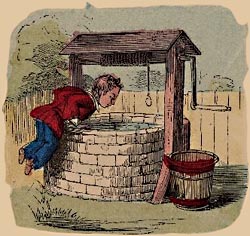
Naughty Willey Bell
Fell into the well,
Though Mamma told him not to move its cover;
For this stubborn little elf
Only chose to please himself,
Looking in, he turned giddy, and fell over.
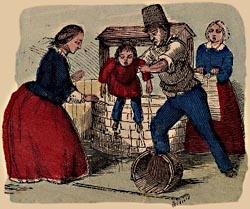
But the gardener heard him shout,
And with assistance got him out;
You never saw a boy in such a mess;
In future he will find
Mamma he’d better mind,
Nor again ever cause her such distress.
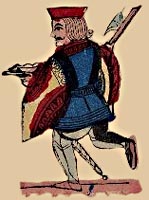
The queen of hearts
She made some tarts,
All on a summer’s day;
The knave of hearts
He stole those tarts,
And with them ran away:
The king of hearts
Call’d for those tarts,
And beat the knave full sore;
The knave of hearts
Brought back those tarts,
And said he’d ne’er steal more.
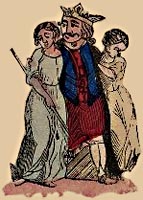
The king of spades
He kiss’d the maids,
Which vex’d the queen full sore;
The queen of spades
She beat those maids,
And turned them out of door:
The knave of spades
Grieved for those jades,
And did for them implore;
The queen so gent,
She did relent,
And vow’d she’d ne’er strike more.
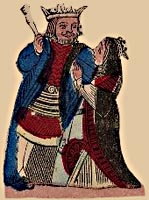
The king of clubs
He often drubs
His loving queen and wife;
The queen of clubs
Returns him snubs,
And all is noise and strife:
The knave of clubs
Gives winks and rubs,
And swears he’ll take her part;
For when our kings
Will do such things,
They should be made to smart.
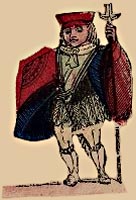
The diamond king
I fain would sing,
And likewise his fair queen;
But that the knave,
A haughty slave,
Must needs step in between:
“Good diamond king,
With hempen string
This haughty knave destroy;
Then may your queen,
With mind serene,
Your royal love enjoy.”
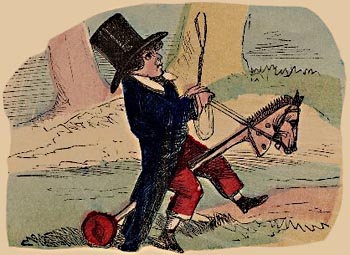
To market, to market, a gallop, a trot,
To buy some meat to put in the pot;
Five cents a quarter, ten cents a side,
If it hadn’t been killed, it must have died.
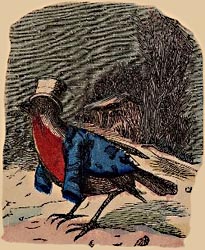
The North Wind doth blow,
And we shall have snow,
And what will poor Robin do then?
He will hop to a barn,
And to keep himself warm,
Will hide his head under his wing,
Poor thing!
Away, pretty Robin, fly home to your nest,
To make you my captive I still should like best,
And feed you with worms and with bread:
Your eyes are so sparkling, your feathers so soft,
Your little wings flutter so pretty aloft,
And your breast is all cover’d with red.
When I was a little boy, my mother kept me in,
Now I am a great boy and fit to serve the king;
I can handle a musket, I can smoke a pipe,
I can kiss a pretty girl at ten o’clock at night.
Mary had a pretty bird,
Feathers bright and yellow,
Slender legs, upon my word
He was a pretty fellow.
The sweetest notes he always sung,
Which much delighted Mary,
And often where the cage was hung,
She stood to hear Canary.
Miss Jane had a bag, and a mouse was in it,
She opened the bag, he was out in a minute,
The Cat saw him jump, and run under the table,
And the dog said, catch him, puss, soon as you’re able.
MAJA’S ALPHABET.
A is for Ann, who is milking a cow;
B is for Benjamin, making a bow.
C is for Charlotte, gathering flowers;
D ’s for Dick, who is one of the mowers.
E is for Eliza, feeding a hen;
F is for Frank, who is mending his pen.
G ’s for Georgiana, shooting an arrow;
H is for Harry, wheeling a barrow.
I ’s for Isabella, gathering fruit;
J is for John, who is playing the flute.
K ’s for Kate, who is nursing her dolly;
L is for Lawrence, feeding Poor Polly.
M is for Maja, learning to draw;
N is for Nicholas, with a jackdaw.
O ’s for Octavius, riding a goat;
P ’s for Penelope, sailing a boat.
Q is for Quintus, armed with a lance;
R is for Rachel, learning to dance.
S ’s for Sarah, talking to the cook;
T is for Thomas, reading a book.
U ’s for Urban, rolling on the green;
V ’s named Victoria, after the Queen.
W is for Walter, flying a kite;
X is for Xerxes, a boy of great might.
Y ’s for Miss Youthful, eating her bread;
AND
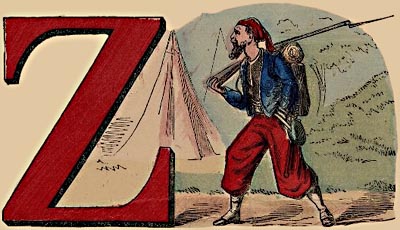
Z ’s for Zouave, gone to the War.
